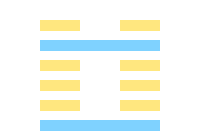Yi Jing Hexagram 50
The hexagram: 50
An hexagram is a combination of six yin and yang lines.

50 - THE TING HEXAGRAM.
Ting gives the intimation of great progress and success.
Bing DeepL Google Yandex50 - T’ing, le chaudron
T’ing : chaudron à trois pieds, vase du sacrifice, sacrifice.
Ko « vase à cuire (pour le sacrifice), symbole d’un principe heureux et d’un développement avantageux ». Les saints cuisaient les offrandes pour honorer Shang-ti et faisaient de grandes fêtes pour entretenir les saints et les sages.
Texte
Le chaudron est un symbole de principe heureux ; de développement prospère.
Symbolisme
Le feu entrant dans le bois figure « cuire ». Le sage garde sa dignité et maintient son destin céleste.
Commentaire
Les saints cuisaient leurs offrandes pour honorer Shang-ti et faisaient de grands festins pour entretenir les hommes saints et sages.
La docilité et la finesse d’ouïe, la clarté de la vue chez le faible qui progresse et s’élève, qui garde le milieu, obéit au puissant et s’accorde avec lui, tout cela donne la prospérité et le succès.
The trigrams
The trigrams are combinations of three yin and yang lines. The three bottom lines of the hexagram form the lower trigram and represent the inner situation. The three top lines form the upper trigram and represent the outer situation.
Upper trigram: The fire

Lower trigram: The wind

Line Comments
The lines represent the evolution of the hexagram, from the bottom (young) to the top (old).

50.1 (50 > 14) - THE TING HEXAGRAM.
The first line, divided, shows the caldron overthrown and its feet turned up. (But) there will be advantage in its getting rid of what was bad in it. (Or it shows us) the concubine (whose position is improved) by means of her son. There will be no error.
Bing DeepL Google Yandex50.1 (50 > 14) - Doing recovery
One prepares what others have set aside to make it useful.
Bing DeepL Google Yandex50.1 (50 > 14) - Doing recovery
One prepares what others have set aside to make it useful.
Bing DeepL Google Yandex50.1 (50 > 14) - T’ing, le chaudron
T’ing : chaudron à trois pieds, vase du sacrifice, sacrifice.
Quand le chaudron est retourné, on peut aisément en faire tomber ce qui est mauvais (et s’attacher au bien). Une concubine qui a un fils n’aura point de regret d’avoir été prise comme telle.
Note. Nous avons ici deux proverbes signifiant que « le bien peut venir du mal ». Le fils de la concubine peut devenir héritier et, en tout cas, assure une position honorable à sa mère.
50.1 (50 > 14) - Faire de la récupération
On prépare ce que les autres ont mis de côté pour qu'il soit utile.
Bing DeepL Google Yandex50.1 (50 > 14) - Bevonás
Felkészül abból amit mások elrontottak hogy segíthessen rajtuk.
Bing DeepL Google Yandex
50.2 (50 > 56) - THE TING HEXAGRAM.
The second line, undivided, shows the caldron with the things (to be cooked) in it. (If its subject can say), ‘My enemy dislikes me, but he cannot approach me,’ there will be good fortune.
Bing DeepL Google Yandex50.2 (50 > 56) - Arousing envy
One succeeds better than one's friends because one has gotten supplies.
Bing DeepL Google Yandex50.2 (50 > 56) - Arousing envy
One succeeds better than one's friends because one has gotten supplies.
Bing DeepL Google Yandex50.2 (50 > 56) - T’ing, le chaudron
T’ing : chaudron à trois pieds, vase du sacrifice, sacrifice.
Chaudron plein de fruits. — Mon chaudron est plein, mais mon commensal ne peut venir à moi. — Symboles des peines perdues ou d’un cœur vertueux.
Bing DeepL Google Yandex50.2 (50 > 56) - Faire des envieux
On réussit mieux que ses amis car on s'est approvisionné.
Bing DeepL Google Yandex
50.3 (50 > 64) - THE TING HEXAGRAM.
The third line, undivided, shows the caldron with (the places of) its ears changed. The progress (of its subject) is (thus) stopped. The fat flesh of the pheasant (which is in the caldron) will not be eaten. But the (genial) rain will come, and the grounds for repentance will disappear. There will be good fortune in the end.
Bing DeepL Google Yandex50.3 (50 > 64) - Becoming aware of one' s insufficiency
One may ask for help because it is difficult to search without the others.
Bing DeepL Google Yandex50.3 (50 > 64) - Becoming aware of one' s insufficiency
One may ask for help because it is difficult to search without the others.
Bing DeepL Google Yandex50.3 (50 > 64) - T’ing, le chaudron
T’ing : chaudron à trois pieds, vase du sacrifice, sacrifice.
Si les oreilles du chaudron sont enlevées, son usage est empêché. On ne peut ni le lever, ni l’emporter. — La chair grasse du faisan (qui y cuisait) ne pourra être mangée. Mais une heureuse circonstance survenant dissipera les soucis. (Symbole de malheurs réparés.)
Bing DeepL Google Yandex50.3 (50 > 64) - Prendre conscience de son insuffisance
On peut demander de l'aide car c'est difficile de chercher sans les autres.
Bing DeepL Google Yandex50.3 (50 > 64) - Bevonás
Segítséget kérhet, mert nehéz a többiek nélkül keresni.
Bing DeepL Google Yandex
50.4 (50 > 18) - THE TING HEXAGRAM.
The fourth line, undivided, shows the caldron with its feet broken ; and its contents, designed for the ruler's use, overturned and spilt. Its subject will be made to blush for shame. There will be evil.
Bing DeepL Google Yandex50.4 (50 > 18) - Causing damage
One has to repair because one broke something.
Bing DeepL Google Yandex50.4 (50 > 18) - Causing damage
One has to repair because one broke something.
Bing DeepL Google Yandex50.4 (50 > 18) - T’ing, le chaudron
T’ing : chaudron à trois pieds, vase du sacrifice, sacrifice.
Si le chaudron a le pied brisé, les aliments préparés pour le prince sont renversés ; tout l’extérieur en est souillé. (Symbole du manque de fidélité.)
Bing DeepL Google Yandex50.4 (50 > 18) - Causer des dommages
On doit réparer car on a cassé quelque chose.
Bing DeepL Google Yandex
50.5 (50 > 44) - THE TING HEXAGRAM.
The fifth line, divided, shows the caldron with yellow ears and rings of metal in them. There will be advantage through being firm and correct.
Bing DeepL Google Yandex50.5 (50 > 44) - T’ing, le chaudron
T’ing : chaudron à trois pieds, vase du sacrifice, sacrifice.
Un chaudron aux oreilles, aux anneaux d’or, représente la prospérité venant de la fidélité.
Bing DeepL Google Yandex
50.6 (50 > 32) - THE TING HEXAGRAM.
The sixth line, undivided, shows the caldron with rings of jade. There will be great good for- tune, and all action taken will be in every way advantageous.
Bing DeepL Google Yandex50.6 (50 > 32) - Returning to one' s former position
One can resume work to help one's friends.
Bing DeepL Google Yandex50.6 (50 > 32) - Returning to one' s former position
One can resume work to help one's friends.
Bing DeepL Google Yandex50.6 (50 > 32) - T’ing, le chaudron
T’ing : chaudron à trois pieds, vase du sacrifice, sacrifice.
Un chaudron aux anneaux de jade représente une grande prospérité, pour qui tout est avantage. Elle arrive quand le fort et le faible observent la mesure.
Bing DeepL Google Yandex50.6 (50 > 32) - Retrouver son poste
On peut reprendre le travail pour aider ses amis.
Bing DeepL Google YandexThe nuclear hexagram: 43
The nuclear hexagram is the association of the two inner trigrams (lines 2,3,4 and 3,4,5). It represents the root, or the origin of the situation.

43 - THE KWÂI HEXAGRAM.
Kwâi requires (in him who would fulfil its meaning) the exhibition (of the culprit's guilt) in the royal court, and a sincere and earnest appeal (for sympathy and support), with a consciousness of the peril (involved in cutting off the criminal). He should (also) make announcement in his own city, and show that it will not be well to have recourse at once to arms. (In this way) there will be advantage in whatever he shall go forward to.
Bing DeepL Google Yandex43 - Revelation
The case must be clearly stated, shouting is dangerous. Explain the situation to your entourage. Avoid any brutality, do not turn away.
Bing DeepL Google Yandex43 - Revelation
The case must be clearly stated, shouting is dangerous. Explain the situation to your entourage. Avoid any brutality, do not turn away.
Bing DeepL Google Yandex43 - Kwài, la décision
Kwāi : 1. Rivière divisée en branches ; diviser, couper, disperser ; 2. Décider, régler définitivement, résolu, tranchant ; 3. Habileté, art, prudence.
Texte
Allant à la cour du prince, on doit y faire appel avec sincérité. En cas de différend, on doit avertir ses concitoyens qu’il n’y a pas avantage à recourir aux moyens violents, aux armes, mais qu’il faut faire décider par le pouvoir judiciaire.
Symbolisme
La ligne faible (coupée) au haut de cinq fortes représente l’appel (du petit) à la cour du prince. — Le ciel sur l’eau stagnante représente la décision ferme. Si le sage, en donnant des émoluments à ses inférieurs, veut rester fidèle à la vertu, il devra être très prudent.
Commentaire
Kwài est « décider, régler ». Le fort le fait pour le faible. Il faut en cela, fermeté et douceur, résolution et concorde. « Appel sincère » dans une difficulté grave. Le recours aux armes fait périr ce qu’on tient le plus à avoir. Le fort emporte le bon et c’est tout.
43 - La révélation
L'affaire doit être exposée clairement, crier entraîne le danger. Expliquer la situation à son entourage. Eviter toute brutalité, ne pas se détourner.
Bing DeepL Google Yandex43 - Kinyilatkoztatás
Az aggodalmakat egyértelműen kell ismertetni, a hangos nézeteltérés veszélyt okoz. Ki kell fejteni a helyzetet a kisérőinek. Kerülni kell az erőszakot és nem szabad eltérülni.
Bing DeepL Google YandexThe complementary hexagram: 3
The companion hexagram that makes the situation whole.

3 - THE KUN HEXAGRAM
Kun (indicates that in the case which it presupposes) there will be great progress and success, and the advantage will come from being correct and firm. (But) any movement in advance should not be (lightly) undertaken. There will be advantage in appointing feudal princes.
Bing DeepL Google Yandex3 - Resolving difficulties
Time will need to be spent. Seek assistance and clarify the situation by identifying the problems. The others will be of great help in finding a solution.
Bing DeepL Google Yandex3 - Resolving difficulties
Time will need to be spent. Seek assistance and clarify the situation by identifying the problems. The others will be of great help in finding a solution.
Bing DeepL Google Yandex3 - T’un, la difficulté initiale
T’un et tchun : A. 1. Bourgeon, pousse ; 2. Croissance, activité ; 3. Grandir, avancer. — B. Difficultés, arrêté dans son avancement, échec.
Texte
C’est le commencement se développant, mais non affermi, achevé ; arrêté au contraire. Par l’activité, le succès s’établit heureusement en tout ce qu’on peut faire.
Symbolisme
Le tonnerre sous les nuages, entravé par eux, figure les difficultés. Le sage arrange les choses selon les exigences de celles-ci.
Commentaire
(Les deux premiers koua ont représenté séparément les deux principes.) Ici commencent leur mélange et leurs difficultés. C’est l’activité dans ces difficultés qui mène au grand succès. Quand le Ciel envoie (un temps de) troubles et (de) ténèbres, il est bon d’établir des chefs féodaux et de ne point se livrer à la sécurité et au repos. (Ceci semble ajouté par Wuh-Wang ou Tchéou-Kong pour justifier leur conduite. Wuh-Wang créa plus de cent fiefs.)
Note. Cette section se rapporte presque tout entière à tchun « difficultés entravant l’avancement, la réussite » ; 1, 2, 3, 4, 6 s’y réfèrent ; § 5 semble se rapporter aux deux mots : t’un et tchun. L’ordre originaire des phrases a été troublé ici : § 6 doit suivre 2a, et 4, 2b... ; § 6 ne semble être qu’une interpolation destinée à compléter le nombre 6. Le § 4 semble être dans le même sens. Le § 3 indique la conduite à tenir dans une difficulté imprévue.
3 - Remédier aux difficultés
Il faudra consacrer du temps. Rechercher de l'assistance et clarifier la situation en identifiant les problèmes. Les autres seront d'un grand secours dans la recherche d'une solution.
Bing DeepL Google Yandex3 - Megoldás
Időt kell rá fordítani. Segítséget kell kérni és tisztázni a helyzetet a problémák azonosításával.
Bing DeepL Google YandexThe mirror hexagram: 49
The mirror hexagram shows a movement in the reverse direction. When an hexagram is its own mirror, it either means that the hexagram goes in both directions or does not move at all.

49 - THE KO HEXAGRAM.
(What takes place as indicated by) Ko is believed in only after it has been accomplished. There will be great progress and success. Advantage will come from being firm and correct. (In that case) occasion for repentance will disappear.
Bing DeepL Google Yandex49 - Tidying up
Renewal is necessary when shortcomings are identified and a replacement plan is in place. One will then have an interest in making the changes. Forget about regrets.
Bing DeepL Google Yandex49 - Tidying up
Renewal is necessary when shortcomings are identified and a replacement plan is in place. One will then have an interest in making the changes. Forget about regrets.
Bing DeepL Google Yandex49 - Koh, la révolution, la mue
Koh : 1. Peau, cuir, tanner, écorcher ; 2. Changer, différer.
Ko « changement, amélioration ». Quand, après avoir parlé, on se montre digne de confiance, tout suit un heureux cours, et le repentir disparaît (n’a plus de raison d’être).
Texte
Quand (on change) et qu’on devient sincèrement droit, on sera après cela constamment sans regret.
Symbolisme
L’eau sous le feu figure le changement. L’homme supérieur règle ses calculs (le calendrier) d’après les changements du ciel et annonce les temps et les saisons. — Dans les marais même il y a du feu.
Commentaire
L’eau et le feu, arrêtant mutuellement leur action, figurent koh. Il en est de même de deux soeurs habitant ensemble et de volontés différentes, opposées.
Après un certain temps, se montrer sincère, c’est changer, se corriger ; on inspire alors confiance. Par le talent et l’intelligence, on acquiert la satisfaction ; par de grands progrès en vertu, on acquiert la rectitude. Quand on change de cette manière, tous les sujets de regret disparaissent.
Le ciel et la terre changeant, les quatre saisons s’accomplissent. Tang et Wuh-Wang changèrent le décret céleste. Ainsi, ils obéirent au ciel et répondirent au désir des hommes. Grand, en effet, et bien important est le moment des changements.
Note. Tang est le chef de la dynastie Shang, qui enleva le trône au dernier des Hia (Ire dynastie), devenu tyran. Wuh-Wang renversa de même le dernier des Shang et lui enleva le décret céleste qui l’avait fait roi.
Note. Le § 1 prend le mot koh dans le sens de cuir ; les autres dans l’acception de changement, changement de conduite, correction ; changement d’ordres, de dispositions chez le sage et le grand ; changement des saisons, le plus important de tous, dit un commentaire
49 - Ranger
Le renouvellement est nécessaire quand on constate des insuffisances et que l'on a un plan de remplacement. On aura alors intérêt à mener les changements à bien. Oublier les regrets.
Bing DeepL Google Yandex49 - Vándor
Megújulásra van szükség ha hiányosságok tapasztalhatók és tartalék tervre. Az lesz az érdekük, hogy befejezzék a változást. El kell felejteni a megbánást.
Bing DeepL Google YandexMutations

50 - THE TING HEXAGRAM.
Ting gives the intimation of great progress and success.
Bing DeepL Google Yandex50 - T’ing, le chaudron
T’ing : chaudron à trois pieds, vase du sacrifice, sacrifice.
Ko « vase à cuire (pour le sacrifice), symbole d’un principe heureux et d’un développement avantageux ». Les saints cuisaient les offrandes pour honorer Shang-ti et faisaient de grandes fêtes pour entretenir les saints et les sages.
Texte
Le chaudron est un symbole de principe heureux ; de développement prospère.
Symbolisme
Le feu entrant dans le bois figure « cuire ». Le sage garde sa dignité et maintient son destin céleste.
Commentaire
Les saints cuisaient leurs offrandes pour honorer Shang-ti et faisaient de grands festins pour entretenir les hommes saints et sages.
La docilité et la finesse d’ouïe, la clarté de la vue chez le faible qui progresse et s’élève, qui garde le milieu, obéit au puissant et s’accorde avec lui, tout cela donne la prospérité et le succès.

50.1 (50 > 14) - THE TING HEXAGRAM.
The first line, divided, shows the caldron overthrown and its feet turned up. (But) there will be advantage in its getting rid of what was bad in it. (Or it shows us) the concubine (whose position is improved) by means of her son. There will be no error.
Bing DeepL Google Yandex50.1 (50 > 14) - Doing recovery
One prepares what others have set aside to make it useful.
Bing DeepL Google Yandex50.1 (50 > 14) - Doing recovery
One prepares what others have set aside to make it useful.
Bing DeepL Google Yandex50.1 (50 > 14) - T’ing, le chaudron
T’ing : chaudron à trois pieds, vase du sacrifice, sacrifice.
Quand le chaudron est retourné, on peut aisément en faire tomber ce qui est mauvais (et s’attacher au bien). Une concubine qui a un fils n’aura point de regret d’avoir été prise comme telle.
Note. Nous avons ici deux proverbes signifiant que « le bien peut venir du mal ». Le fils de la concubine peut devenir héritier et, en tout cas, assure une position honorable à sa mère.
50.1 (50 > 14) - Faire de la récupération
On prépare ce que les autres ont mis de côté pour qu'il soit utile.
Bing DeepL Google Yandex50.1 (50 > 14) - Bevonás
Felkészül abból amit mások elrontottak hogy segíthessen rajtuk.
Bing DeepL Google Yandex
50.2 (50 > 56) - THE TING HEXAGRAM.
The second line, undivided, shows the caldron with the things (to be cooked) in it. (If its subject can say), ‘My enemy dislikes me, but he cannot approach me,’ there will be good fortune.
Bing DeepL Google Yandex50.2 (50 > 56) - Arousing envy
One succeeds better than one's friends because one has gotten supplies.
Bing DeepL Google Yandex50.2 (50 > 56) - Arousing envy
One succeeds better than one's friends because one has gotten supplies.
Bing DeepL Google Yandex50.2 (50 > 56) - T’ing, le chaudron
T’ing : chaudron à trois pieds, vase du sacrifice, sacrifice.
Chaudron plein de fruits. — Mon chaudron est plein, mais mon commensal ne peut venir à moi. — Symboles des peines perdues ou d’un cœur vertueux.
Bing DeepL Google Yandex50.2 (50 > 56) - Faire des envieux
On réussit mieux que ses amis car on s'est approvisionné.
Bing DeepL Google Yandex
50.1.2 (50 > 30) - THE TING HEXAGRAM.
- 1. The first line, divided, shows the caldron overthrown and its feet turned up. (But) there will be advantage in its getting rid of what was bad in it. (Or it shows us) the concubine (whose position is improved) by means of her son. There will be no error.
- 2. The second line, undivided, shows the caldron with the things (to be cooked) in it. (If its subject can say), ‘My enemy dislikes me, but he cannot approach me,’ there will be good fortune.
50.1.2 (50 > 30) - Involvement
One can conceive what others cannot produce.
Bing DeepL Google Yandex50.1.2 (50 > 30) - Involvement
One can conceive what others cannot produce.
Bing DeepL Google Yandex50.1.2 (50 > 30) - T’ing, le chaudron
T’ing : chaudron à trois pieds, vase du sacrifice, sacrifice.
-
1. Quand le chaudron est retourné, on peut aisément en faire tomber ce qui est mauvais (et s’attacher au bien). Une concubine qui a un fils n’aura point de regret d’avoir été prise comme telle.
Note. Nous avons ici deux proverbes signifiant que « le bien peut venir du mal ». Le fils de la concubine peut devenir héritier et, en tout cas, assure une position honorable à sa mère. - 2. Chaudron plein de fruits. — Mon chaudron est plein, mais mon commensal ne peut venir à moi. — Symboles des peines perdues ou d’un cœur vertueux.
50.1.2 (50 > 30) - L'engagement
On arrive à concevoir ce que les autres n'arrivent pas à produire.
Bing DeepL Google Yandex50.1.2 (50 > 30) - Bevonás
- 1. Felkészül abból amit mások elrontottak hogy segíthessen rajtuk.
- 2. Sikeresebb társainál mert jobbak az eszközei.

50.3 (50 > 64) - THE TING HEXAGRAM.
The third line, undivided, shows the caldron with (the places of) its ears changed. The progress (of its subject) is (thus) stopped. The fat flesh of the pheasant (which is in the caldron) will not be eaten. But the (genial) rain will come, and the grounds for repentance will disappear. There will be good fortune in the end.
Bing DeepL Google Yandex50.3 (50 > 64) - Becoming aware of one' s insufficiency
One may ask for help because it is difficult to search without the others.
Bing DeepL Google Yandex50.3 (50 > 64) - Becoming aware of one' s insufficiency
One may ask for help because it is difficult to search without the others.
Bing DeepL Google Yandex50.3 (50 > 64) - T’ing, le chaudron
T’ing : chaudron à trois pieds, vase du sacrifice, sacrifice.
Si les oreilles du chaudron sont enlevées, son usage est empêché. On ne peut ni le lever, ni l’emporter. — La chair grasse du faisan (qui y cuisait) ne pourra être mangée. Mais une heureuse circonstance survenant dissipera les soucis. (Symbole de malheurs réparés.)
Bing DeepL Google Yandex50.3 (50 > 64) - Prendre conscience de son insuffisance
On peut demander de l'aide car c'est difficile de chercher sans les autres.
Bing DeepL Google Yandex50.3 (50 > 64) - Bevonás
Segítséget kérhet, mert nehéz a többiek nélkül keresni.
Bing DeepL Google Yandex
50.1.3 (50 > 38) - THE TING HEXAGRAM.
- 1. The first line, divided, shows the caldron overthrown and its feet turned up. (But) there will be advantage in its getting rid of what was bad in it. (Or it shows us) the concubine (whose position is improved) by means of her son. There will be no error.
- 3. The third line, undivided, shows the caldron with (the places of) its ears changed. The progress (of its subject) is (thus) stopped. The fat flesh of the pheasant (which is in the caldron) will not be eaten. But the (genial) rain will come, and the grounds for repentance will disappear. There will be good fortune in the end.
50.1.3 (50 > 38) - Involvement
One is confronted with one's own contradictions.
Bing DeepL Google Yandex50.1.3 (50 > 38) - Involvement
One is confronted with one's own contradictions.
Bing DeepL Google Yandex50.1.3 (50 > 38) - T’ing, le chaudron
T’ing : chaudron à trois pieds, vase du sacrifice, sacrifice.
-
1. Quand le chaudron est retourné, on peut aisément en faire tomber ce qui est mauvais (et s’attacher au bien). Une concubine qui a un fils n’aura point de regret d’avoir été prise comme telle.
Note. Nous avons ici deux proverbes signifiant que « le bien peut venir du mal ». Le fils de la concubine peut devenir héritier et, en tout cas, assure une position honorable à sa mère. - 3. Si les oreilles du chaudron sont enlevées, son usage est empêché. On ne peut ni le lever, ni l’emporter. — La chair grasse du faisan (qui y cuisait) ne pourra être mangée. Mais une heureuse circonstance survenant dissipera les soucis. (Symbole de malheurs réparés.)
50.1.3 (50 > 38) - L'engagement
On est en prise avec ses propres contradictions.
Bing DeepL Google Yandex50.1.3 (50 > 38) - Bevonás
- 1. Felkészül abból amit mások elrontottak hogy segíthessen rajtuk.
- 3. Segítséget kérhet, mert nehéz a többiek nélkül keresni.

50.2.3 (50 > 35) - THE TING HEXAGRAM.
- 2. The second line, undivided, shows the caldron with the things (to be cooked) in it. (If its subject can say), ‘My enemy dislikes me, but he cannot approach me,’ there will be good fortune.
- 3. The third line, undivided, shows the caldron with (the places of) its ears changed. The progress (of its subject) is (thus) stopped. The fat flesh of the pheasant (which is in the caldron) will not be eaten. But the (genial) rain will come, and the grounds for repentance will disappear. There will be good fortune in the end.
50.2.3 (50 > 35) - Involvement
One consults one's relatives to get consistent answers.
Bing DeepL Google Yandex50.2.3 (50 > 35) - Involvement
One consults one's relatives to get consistent answers.
Bing DeepL Google Yandex50.2.3 (50 > 35) - T’ing, le chaudron
T’ing : chaudron à trois pieds, vase du sacrifice, sacrifice.
- 2. Chaudron plein de fruits. — Mon chaudron est plein, mais mon commensal ne peut venir à moi. — Symboles des peines perdues ou d’un cœur vertueux.
- 3. Si les oreilles du chaudron sont enlevées, son usage est empêché. On ne peut ni le lever, ni l’emporter. — La chair grasse du faisan (qui y cuisait) ne pourra être mangée. Mais une heureuse circonstance survenant dissipera les soucis. (Symbole de malheurs réparés.)
50.2.3 (50 > 35) - L'engagement
On consulte ses proches pour obtenir des réponses cohérentes.
Bing DeepL Google Yandex50.2.3 (50 > 35) - Bevonás
- 2. Sikeresebb társainál mert jobbak az eszközei.
- 3. Segítséget kérhet, mert nehéz a többiek nélkül keresni.

50.1.2.3 (50 > 21) - THE TING HEXAGRAM.
- 1. The first line, divided, shows the caldron overthrown and its feet turned up. (But) there will be advantage in its getting rid of what was bad in it. (Or it shows us) the concubine (whose position is improved) by means of her son. There will be no error.
- 2. The second line, undivided, shows the caldron with the things (to be cooked) in it. (If its subject can say), ‘My enemy dislikes me, but he cannot approach me,’ there will be good fortune.
- 3. The third line, undivided, shows the caldron with (the places of) its ears changed. The progress (of its subject) is (thus) stopped. The fat flesh of the pheasant (which is in the caldron) will not be eaten. But the (genial) rain will come, and the grounds for repentance will disappear. There will be good fortune in the end.
50.1.2.3 (50 > 21) - Involvement
One tries to reassure one's relatives by promising not to do it again.
Bing DeepL Google Yandex50.1.2.3 (50 > 21) - Involvement
One tries to reassure one's relatives by promising not to do it again.
Bing DeepL Google Yandex50.1.2.3 (50 > 21) - T’ing, le chaudron
T’ing : chaudron à trois pieds, vase du sacrifice, sacrifice.
-
1. Quand le chaudron est retourné, on peut aisément en faire tomber ce qui est mauvais (et s’attacher au bien). Une concubine qui a un fils n’aura point de regret d’avoir été prise comme telle.
Note. Nous avons ici deux proverbes signifiant que « le bien peut venir du mal ». Le fils de la concubine peut devenir héritier et, en tout cas, assure une position honorable à sa mère. - 2. Chaudron plein de fruits. — Mon chaudron est plein, mais mon commensal ne peut venir à moi. — Symboles des peines perdues ou d’un cœur vertueux.
- 3. Si les oreilles du chaudron sont enlevées, son usage est empêché. On ne peut ni le lever, ni l’emporter. — La chair grasse du faisan (qui y cuisait) ne pourra être mangée. Mais une heureuse circonstance survenant dissipera les soucis. (Symbole de malheurs réparés.)
50.1.2.3 (50 > 21) - L'engagement
On tente de rassurer ses proches en leur promettant de ne pas recommencer.
Bing DeepL Google Yandex50.1.2.3 (50 > 21) - Bevonás
- 1. Felkészül abból amit mások elrontottak hogy segíthessen rajtuk.
- 2. Sikeresebb társainál mert jobbak az eszközei.
- 3. Segítséget kérhet, mert nehéz a többiek nélkül keresni.

50.4 (50 > 18) - THE TING HEXAGRAM.
The fourth line, undivided, shows the caldron with its feet broken ; and its contents, designed for the ruler's use, overturned and spilt. Its subject will be made to blush for shame. There will be evil.
Bing DeepL Google Yandex50.4 (50 > 18) - Causing damage
One has to repair because one broke something.
Bing DeepL Google Yandex50.4 (50 > 18) - Causing damage
One has to repair because one broke something.
Bing DeepL Google Yandex50.4 (50 > 18) - T’ing, le chaudron
T’ing : chaudron à trois pieds, vase du sacrifice, sacrifice.
Si le chaudron a le pied brisé, les aliments préparés pour le prince sont renversés ; tout l’extérieur en est souillé. (Symbole du manque de fidélité.)
Bing DeepL Google Yandex50.4 (50 > 18) - Causer des dommages
On doit réparer car on a cassé quelque chose.
Bing DeepL Google Yandex
50.1.4 (50 > 26) - THE TING HEXAGRAM.
- 1. The first line, divided, shows the caldron overthrown and its feet turned up. (But) there will be advantage in its getting rid of what was bad in it. (Or it shows us) the concubine (whose position is improved) by means of her son. There will be no error.
- 4. The fourth line, undivided, shows the caldron with its feet broken ; and its contents, designed for the ruler's use, overturned and spilt. Its subject will be made to blush for shame. There will be evil.
50.1.4 (50 > 26) - Involvement
One has difficulty acclimatising because of the negligence of superiors to take measures in accordance with the requests that one made.
Bing DeepL Google Yandex50.1.4 (50 > 26) - Involvement
One has difficulty acclimatizing because of the negligence of superiors to take measures in accordance with the requests that one made.
Bing DeepL Google Yandex50.1.4 (50 > 26) - T’ing, le chaudron
T’ing : chaudron à trois pieds, vase du sacrifice, sacrifice.
-
1. Quand le chaudron est retourné, on peut aisément en faire tomber ce qui est mauvais (et s’attacher au bien). Une concubine qui a un fils n’aura point de regret d’avoir été prise comme telle.
Note. Nous avons ici deux proverbes signifiant que « le bien peut venir du mal ». Le fils de la concubine peut devenir héritier et, en tout cas, assure une position honorable à sa mère. - 4. Si le chaudron a le pied brisé, les aliments préparés pour le prince sont renversés ; tout l’extérieur en est souillé. (Symbole du manque de fidélité.)
50.1.4 (50 > 26) - L'engagement
On s'acclimate difficilement à cause de la négligence des supérieurs à prendre des mesures conformes aux demandes que l'on a faites.
Bing DeepL Google Yandex50.1.4 (50 > 26) - Bevonás
- 1. Felkészül abból amit mások elrontottak hogy segíthessen rajtuk.
- 4. Meg kell javítania amit eltört.

50.2.4 (50 > 52) - THE TING HEXAGRAM.
- 2. The second line, undivided, shows the caldron with the things (to be cooked) in it. (If its subject can say), ‘My enemy dislikes me, but he cannot approach me,’ there will be good fortune.
- 4. The fourth line, undivided, shows the caldron with its feet broken ; and its contents, designed for the ruler's use, overturned and spilt. Its subject will be made to blush for shame. There will be evil.
50.2.4 (50 > 52) - Involvement
One thinks one knows what to ask, but others will not be satisfied with pointless questions.
Bing DeepL Google Yandex50.2.4 (50 > 52) - Involvement
One thinks one knows what to ask, but others will not be satisfied with pointless questions.
Bing DeepL Google Yandex50.2.4 (50 > 52) - T’ing, le chaudron
T’ing : chaudron à trois pieds, vase du sacrifice, sacrifice.
- 2. Chaudron plein de fruits. — Mon chaudron est plein, mais mon commensal ne peut venir à moi. — Symboles des peines perdues ou d’un cœur vertueux.
- 4. Si le chaudron a le pied brisé, les aliments préparés pour le prince sont renversés ; tout l’extérieur en est souillé. (Symbole du manque de fidélité.)
50.2.4 (50 > 52) - L'engagement
On croit savoir ce qu'il faut demander mais les autres ne seront pas satisfaits avec des questions sans intérêt.
Bing DeepL Google Yandex50.2.4 (50 > 52) - Bevonás
- 2. Sikeresebb társainál mert jobbak az eszközei.
- 4. Meg kell javítania amit eltört.

50.1.2.4 (50 > 22) - THE TING HEXAGRAM.
- 1. The first line, divided, shows the caldron overthrown and its feet turned up. (But) there will be advantage in its getting rid of what was bad in it. (Or it shows us) the concubine (whose position is improved) by means of her son. There will be no error.
- 2. The second line, undivided, shows the caldron with the things (to be cooked) in it. (If its subject can say), ‘My enemy dislikes me, but he cannot approach me,’ there will be good fortune.
- 4. The fourth line, undivided, shows the caldron with its feet broken ; and its contents, designed for the ruler's use, overturned and spilt. Its subject will be made to blush for shame. There will be evil.
50.1.2.4 (50 > 22) - T’ing, le chaudron
T’ing : chaudron à trois pieds, vase du sacrifice, sacrifice.
-
1. Quand le chaudron est retourné, on peut aisément en faire tomber ce qui est mauvais (et s’attacher au bien). Une concubine qui a un fils n’aura point de regret d’avoir été prise comme telle.
Note. Nous avons ici deux proverbes signifiant que « le bien peut venir du mal ». Le fils de la concubine peut devenir héritier et, en tout cas, assure une position honorable à sa mère. - 2. Chaudron plein de fruits. — Mon chaudron est plein, mais mon commensal ne peut venir à moi. — Symboles des peines perdues ou d’un cœur vertueux.
- 4. Si le chaudron a le pied brisé, les aliments préparés pour le prince sont renversés ; tout l’extérieur en est souillé. (Symbole du manque de fidélité.)
50.1.2.4 (50 > 22) - Bevonás
- 1. Felkészül abból amit mások elrontottak hogy segíthessen rajtuk.
- 2. Sikeresebb társainál mert jobbak az eszközei.
- 4. Meg kell javítania amit eltört.

50.3.4 (50 > 4) - THE TING HEXAGRAM.
- 3. The third line, undivided, shows the caldron with (the places of) its ears changed. The progress (of its subject) is (thus) stopped. The fat flesh of the pheasant (which is in the caldron) will not be eaten. But the (genial) rain will come, and the grounds for repentance will disappear. There will be good fortune in the end.
- 4. The fourth line, undivided, shows the caldron with its feet broken ; and its contents, designed for the ruler's use, overturned and spilt. Its subject will be made to blush for shame. There will be evil.
50.3.4 (50 > 4) - Involvement
One gets out of trouble with a bitter taste in the mouth.
Bing DeepL Google Yandex50.3.4 (50 > 4) - Involvement
One gets out of trouble with a bitter taste in the mouth.
Bing DeepL Google Yandex50.3.4 (50 > 4) - T’ing, le chaudron
T’ing : chaudron à trois pieds, vase du sacrifice, sacrifice.
- 3. Si les oreilles du chaudron sont enlevées, son usage est empêché. On ne peut ni le lever, ni l’emporter. — La chair grasse du faisan (qui y cuisait) ne pourra être mangée. Mais une heureuse circonstance survenant dissipera les soucis. (Symbole de malheurs réparés.)
- 4. Si le chaudron a le pied brisé, les aliments préparés pour le prince sont renversés ; tout l’extérieur en est souillé. (Symbole du manque de fidélité.)
50.3.4 (50 > 4) - L'engagement
On sort des ennuis avec un goût amer à la bouche.
Bing DeepL Google Yandex50.3.4 (50 > 4) - Bevonás
- 3. Segítséget kérhet, mert nehéz a többiek nélkül keresni.
- 4. Meg kell javítania amit eltört.

50.1.3.4 (50 > 41) - THE TING HEXAGRAM.
- 1. The first line, divided, shows the caldron overthrown and its feet turned up. (But) there will be advantage in its getting rid of what was bad in it. (Or it shows us) the concubine (whose position is improved) by means of her son. There will be no error.
- 3. The third line, undivided, shows the caldron with (the places of) its ears changed. The progress (of its subject) is (thus) stopped. The fat flesh of the pheasant (which is in the caldron) will not be eaten. But the (genial) rain will come, and the grounds for repentance will disappear. There will be good fortune in the end.
- 4. The fourth line, undivided, shows the caldron with its feet broken ; and its contents, designed for the ruler's use, overturned and spilt. Its subject will be made to blush for shame. There will be evil.
50.1.3.4 (50 > 41) - Involvement
One shambles so as not to leave too quickly.
Bing DeepL Google Yandex50.1.3.4 (50 > 41) - Involvement
One shambles so as not to leave too quickly.
Bing DeepL Google Yandex50.1.3.4 (50 > 41) - T’ing, le chaudron
T’ing : chaudron à trois pieds, vase du sacrifice, sacrifice.
-
1. Quand le chaudron est retourné, on peut aisément en faire tomber ce qui est mauvais (et s’attacher au bien). Une concubine qui a un fils n’aura point de regret d’avoir été prise comme telle.
Note. Nous avons ici deux proverbes signifiant que « le bien peut venir du mal ». Le fils de la concubine peut devenir héritier et, en tout cas, assure une position honorable à sa mère. - 3. Si les oreilles du chaudron sont enlevées, son usage est empêché. On ne peut ni le lever, ni l’emporter. — La chair grasse du faisan (qui y cuisait) ne pourra être mangée. Mais une heureuse circonstance survenant dissipera les soucis. (Symbole de malheurs réparés.)
- 4. Si le chaudron a le pied brisé, les aliments préparés pour le prince sont renversés ; tout l’extérieur en est souillé. (Symbole du manque de fidélité.)
50.1.3.4 (50 > 41) - L'engagement
On traîne des pieds pour ne pas partir trop vite.
Bing DeepL Google Yandex50.1.3.4 (50 > 41) - Bevonás
- 1. Felkészül abból amit mások elrontottak hogy segíthessen rajtuk.
- 3. Segítséget kérhet, mert nehéz a többiek nélkül keresni.
- 4. Meg kell javítania amit eltört.

50.2.3.4 (50 > 23) - THE TING HEXAGRAM.
- 2. The second line, undivided, shows the caldron with the things (to be cooked) in it. (If its subject can say), ‘My enemy dislikes me, but he cannot approach me,’ there will be good fortune.
- 3. The third line, undivided, shows the caldron with (the places of) its ears changed. The progress (of its subject) is (thus) stopped. The fat flesh of the pheasant (which is in the caldron) will not be eaten. But the (genial) rain will come, and the grounds for repentance will disappear. There will be good fortune in the end.
- 4. The fourth line, undivided, shows the caldron with its feet broken ; and its contents, designed for the ruler's use, overturned and spilt. Its subject will be made to blush for shame. There will be evil.
50.2.3.4 (50 > 23) - Involvement
One spends peaceful days waiting to be summoned by those who need backup.
Bing DeepL Google Yandex50.2.3.4 (50 > 23) - Involvement
One spends peaceful days waiting to be summoned by those who need backup.
Bing DeepL Google Yandex50.2.3.4 (50 > 23) - T’ing, le chaudron
T’ing : chaudron à trois pieds, vase du sacrifice, sacrifice.
- 2. Chaudron plein de fruits. — Mon chaudron est plein, mais mon commensal ne peut venir à moi. — Symboles des peines perdues ou d’un cœur vertueux.
- 3. Si les oreilles du chaudron sont enlevées, son usage est empêché. On ne peut ni le lever, ni l’emporter. — La chair grasse du faisan (qui y cuisait) ne pourra être mangée. Mais une heureuse circonstance survenant dissipera les soucis. (Symbole de malheurs réparés.)
- 4. Si le chaudron a le pied brisé, les aliments préparés pour le prince sont renversés ; tout l’extérieur en est souillé. (Symbole du manque de fidélité.)
50.2.3.4 (50 > 23) - L'engagement
On coule des jours paisibles en attendant d'être convoqué par ceux qui ont besoin de renforts.
Bing DeepL Google Yandex50.2.3.4 (50 > 23) - Bevonás
- 2. Sikeresebb társainál mert jobbak az eszközei.
- 3. Segítséget kérhet, mert nehéz a többiek nélkül keresni.
- 4. Meg kell javítania amit eltört.

50.1.2.3.4 (50 > 27) - THE TING HEXAGRAM.
- 1. The first line, divided, shows the caldron overthrown and its feet turned up. (But) there will be advantage in its getting rid of what was bad in it. (Or it shows us) the concubine (whose position is improved) by means of her son. There will be no error.
- 2. The second line, undivided, shows the caldron with the things (to be cooked) in it. (If its subject can say), ‘My enemy dislikes me, but he cannot approach me,’ there will be good fortune.
- 3. The third line, undivided, shows the caldron with (the places of) its ears changed. The progress (of its subject) is (thus) stopped. The fat flesh of the pheasant (which is in the caldron) will not be eaten. But the (genial) rain will come, and the grounds for repentance will disappear. There will be good fortune in the end.
- 4. The fourth line, undivided, shows the caldron with its feet broken ; and its contents, designed for the ruler's use, overturned and spilt. Its subject will be made to blush for shame. There will be evil.
50.1.2.3.4 (50 > 27) - Involvement
One prepares the succession by showing others what one has done.
Bing DeepL Google Yandex50.1.2.3.4 (50 > 27) - Involvement
One prepares the succession by showing others what one has done.
Bing DeepL Google Yandex50.1.2.3.4 (50 > 27) - T’ing, le chaudron
T’ing : chaudron à trois pieds, vase du sacrifice, sacrifice.
-
1. Quand le chaudron est retourné, on peut aisément en faire tomber ce qui est mauvais (et s’attacher au bien). Une concubine qui a un fils n’aura point de regret d’avoir été prise comme telle.
Note. Nous avons ici deux proverbes signifiant que « le bien peut venir du mal ». Le fils de la concubine peut devenir héritier et, en tout cas, assure une position honorable à sa mère. - 2. Chaudron plein de fruits. — Mon chaudron est plein, mais mon commensal ne peut venir à moi. — Symboles des peines perdues ou d’un cœur vertueux.
- 3. Si les oreilles du chaudron sont enlevées, son usage est empêché. On ne peut ni le lever, ni l’emporter. — La chair grasse du faisan (qui y cuisait) ne pourra être mangée. Mais une heureuse circonstance survenant dissipera les soucis. (Symbole de malheurs réparés.)
- 4. Si le chaudron a le pied brisé, les aliments préparés pour le prince sont renversés ; tout l’extérieur en est souillé. (Symbole du manque de fidélité.)
50.1.2.3.4 (50 > 27) - L'engagement
On prépare la relève en montrant aux autres ce qu'on a fait.
Bing DeepL Google Yandex50.1.2.3.4 (50 > 27) - Bevonás
- 1. Felkészül abból amit mások elrontottak hogy segíthessen rajtuk.
- 2. Sikeresebb társainál mert jobbak az eszközei.
- 3. Segítséget kérhet, mert nehéz a többiek nélkül keresni.
- 4. Meg kell javítania amit eltört.

50.5 (50 > 44) - THE TING HEXAGRAM.
The fifth line, divided, shows the caldron with yellow ears and rings of metal in them. There will be advantage through being firm and correct.
Bing DeepL Google Yandex50.5 (50 > 44) - T’ing, le chaudron
T’ing : chaudron à trois pieds, vase du sacrifice, sacrifice.
Un chaudron aux oreilles, aux anneaux d’or, représente la prospérité venant de la fidélité.
Bing DeepL Google Yandex
50.1.5 (50 > 1) - THE TING HEXAGRAM.
- 1. The first line, divided, shows the caldron overthrown and its feet turned up. (But) there will be advantage in its getting rid of what was bad in it. (Or it shows us) the concubine (whose position is improved) by means of her son. There will be no error.
- 5. The fifth line, divided, shows the caldron with yellow ears and rings of metal in them. There will be advantage through being firm and correct.
50.1.5 (50 > 1) - Involvement
One feels joy at the thought of being able to meet.
Bing DeepL Google Yandex50.1.5 (50 > 1) - Involvement
One feels joy at the thought of being able to meet.
Bing DeepL Google Yandex50.1.5 (50 > 1) - T’ing, le chaudron
T’ing : chaudron à trois pieds, vase du sacrifice, sacrifice.
-
1. Quand le chaudron est retourné, on peut aisément en faire tomber ce qui est mauvais (et s’attacher au bien). Une concubine qui a un fils n’aura point de regret d’avoir été prise comme telle.
Note. Nous avons ici deux proverbes signifiant que « le bien peut venir du mal ». Le fils de la concubine peut devenir héritier et, en tout cas, assure une position honorable à sa mère. - 5. Un chaudron aux oreilles, aux anneaux d’or, représente la prospérité venant de la fidélité.
50.1.5 (50 > 1) - L'engagement
On éprouve de la joie à l'idée de pouvoir se rencontrer.
Bing DeepL Google Yandex50.1.5 (50 > 1) - Bevonás
- 1. Felkészül abból amit mások elrontottak hogy segíthessen rajtuk.
- 5. Készen áll hogy segítsen.

50.2.5 (50 > 33) - THE TING HEXAGRAM.
- 2. The second line, undivided, shows the caldron with the things (to be cooked) in it. (If its subject can say), ‘My enemy dislikes me, but he cannot approach me,’ there will be good fortune.
- 5. The fifth line, divided, shows the caldron with yellow ears and rings of metal in them. There will be advantage through being firm and correct.
50.2.5 (50 > 33) - T’ing, le chaudron
T’ing : chaudron à trois pieds, vase du sacrifice, sacrifice.
- 2. Chaudron plein de fruits. — Mon chaudron est plein, mais mon commensal ne peut venir à moi. — Symboles des peines perdues ou d’un cœur vertueux.
- 5. Un chaudron aux oreilles, aux anneaux d’or, représente la prospérité venant de la fidélité.
50.2.5 (50 > 33) - L'engagement
On fait une ristourne pour appâter le chaland.
Bing DeepL Google Yandex50.2.5 (50 > 33) - Bevonás
- 2. Sikeresebb társainál mert jobbak az eszközei.
- 5. Készen áll hogy segítsen.

50.1.2.5 (50 > 13) - THE TING HEXAGRAM.
- 1. The first line, divided, shows the caldron overthrown and its feet turned up. (But) there will be advantage in its getting rid of what was bad in it. (Or it shows us) the concubine (whose position is improved) by means of her son. There will be no error.
- 2. The second line, undivided, shows the caldron with the things (to be cooked) in it. (If its subject can say), ‘My enemy dislikes me, but he cannot approach me,’ there will be good fortune.
- 5. The fifth line, divided, shows the caldron with yellow ears and rings of metal in them. There will be advantage through being firm and correct.
50.1.2.5 (50 > 13) - Involvement
One is confronted with a series of questions to which one must answer.
Bing DeepL Google Yandex50.1.2.5 (50 > 13) - Involvement
One is confronted with a series of questions to which one must answer.
Bing DeepL Google Yandex50.1.2.5 (50 > 13) - T’ing, le chaudron
T’ing : chaudron à trois pieds, vase du sacrifice, sacrifice.
-
1. Quand le chaudron est retourné, on peut aisément en faire tomber ce qui est mauvais (et s’attacher au bien). Une concubine qui a un fils n’aura point de regret d’avoir été prise comme telle.
Note. Nous avons ici deux proverbes signifiant que « le bien peut venir du mal ». Le fils de la concubine peut devenir héritier et, en tout cas, assure une position honorable à sa mère. - 2. Chaudron plein de fruits. — Mon chaudron est plein, mais mon commensal ne peut venir à moi. — Symboles des peines perdues ou d’un cœur vertueux.
- 5. Un chaudron aux oreilles, aux anneaux d’or, représente la prospérité venant de la fidélité.
50.1.2.5 (50 > 13) - L'engagement
On est confronté à une série d'interrogations auxquelles on doit répondre.
Bing DeepL Google Yandex50.1.2.5 (50 > 13) - Bevonás
- 1. Felkészül abból amit mások elrontottak hogy segíthessen rajtuk.
- 2. Sikeresebb társainál mert jobbak az eszközei.
- 5. Készen áll hogy segítsen.

50.3.5 (50 > 6) - THE TING HEXAGRAM.
- 3. The third line, undivided, shows the caldron with (the places of) its ears changed. The progress (of its subject) is (thus) stopped. The fat flesh of the pheasant (which is in the caldron) will not be eaten. But the (genial) rain will come, and the grounds for repentance will disappear. There will be good fortune in the end.
- 5. The fifth line, divided, shows the caldron with yellow ears and rings of metal in them. There will be advantage through being firm and correct.
50.3.5 (50 > 6) - Involvement
One repairs in the hope that things will work one day.
Bing DeepL Google Yandex50.3.5 (50 > 6) - Involvement
One repairs in the hope that things will work one day.
Bing DeepL Google Yandex50.3.5 (50 > 6) - T’ing, le chaudron
T’ing : chaudron à trois pieds, vase du sacrifice, sacrifice.
- 3. Si les oreilles du chaudron sont enlevées, son usage est empêché. On ne peut ni le lever, ni l’emporter. — La chair grasse du faisan (qui y cuisait) ne pourra être mangée. Mais une heureuse circonstance survenant dissipera les soucis. (Symbole de malheurs réparés.)
- 5. Un chaudron aux oreilles, aux anneaux d’or, représente la prospérité venant de la fidélité.
50.3.5 (50 > 6) - L'engagement
On répare dans l'espoir que les choses finiront par fonctionner un jour.
Bing DeepL Google Yandex50.3.5 (50 > 6) - Bevonás
- 3. Segítséget kérhet, mert nehéz a többiek nélkül keresni.
- 5. Készen áll hogy segítsen.

50.1.3.5 (50 > 10) - THE TING HEXAGRAM.
- 1. The first line, divided, shows the caldron overthrown and its feet turned up. (But) there will be advantage in its getting rid of what was bad in it. (Or it shows us) the concubine (whose position is improved) by means of her son. There will be no error.
- 3. The third line, undivided, shows the caldron with (the places of) its ears changed. The progress (of its subject) is (thus) stopped. The fat flesh of the pheasant (which is in the caldron) will not be eaten. But the (genial) rain will come, and the grounds for repentance will disappear. There will be good fortune in the end.
- 5. The fifth line, divided, shows the caldron with yellow ears and rings of metal in them. There will be advantage through being firm and correct.
50.1.3.5 (50 > 10) - Involvement
One sorts one's things so as not to have to look for them all the time.
Bing DeepL Google Yandex50.1.3.5 (50 > 10) - Involvement
One sorts one's things so as not to have to look for them all the time.
Bing DeepL Google Yandex50.1.3.5 (50 > 10) - T’ing, le chaudron
T’ing : chaudron à trois pieds, vase du sacrifice, sacrifice.
-
1. Quand le chaudron est retourné, on peut aisément en faire tomber ce qui est mauvais (et s’attacher au bien). Une concubine qui a un fils n’aura point de regret d’avoir été prise comme telle.
Note. Nous avons ici deux proverbes signifiant que « le bien peut venir du mal ». Le fils de la concubine peut devenir héritier et, en tout cas, assure une position honorable à sa mère. - 3. Si les oreilles du chaudron sont enlevées, son usage est empêché. On ne peut ni le lever, ni l’emporter. — La chair grasse du faisan (qui y cuisait) ne pourra être mangée. Mais une heureuse circonstance survenant dissipera les soucis. (Symbole de malheurs réparés.)
- 5. Un chaudron aux oreilles, aux anneaux d’or, représente la prospérité venant de la fidélité.
50.1.3.5 (50 > 10) - L'engagement
On classe ses affaires pour ne pas avoir à les chercher sans arrêt.
Bing DeepL Google Yandex50.1.3.5 (50 > 10) - Bevonás
- 1. Felkészül abból amit mások elrontottak hogy segíthessen rajtuk.
- 3. Segítséget kérhet, mert nehéz a többiek nélkül keresni.
- 5. Készen áll hogy segítsen.

50.2.3.5 (50 > 12) - THE TING HEXAGRAM.
- 2. The second line, undivided, shows the caldron with the things (to be cooked) in it. (If its subject can say), ‘My enemy dislikes me, but he cannot approach me,’ there will be good fortune.
- 3. The third line, undivided, shows the caldron with (the places of) its ears changed. The progress (of its subject) is (thus) stopped. The fat flesh of the pheasant (which is in the caldron) will not be eaten. But the (genial) rain will come, and the grounds for repentance will disappear. There will be good fortune in the end.
- 5. The fifth line, divided, shows the caldron with yellow ears and rings of metal in them. There will be advantage through being firm and correct.
50.2.3.5 (50 > 12) - Involvement
One strives to make more effort so one practices.
Bing DeepL Google Yandex50.2.3.5 (50 > 12) - Involvement
One strives to make more effort so one practices.
Bing DeepL Google Yandex50.2.3.5 (50 > 12) - T’ing, le chaudron
T’ing : chaudron à trois pieds, vase du sacrifice, sacrifice.
- 2. Chaudron plein de fruits. — Mon chaudron est plein, mais mon commensal ne peut venir à moi. — Symboles des peines perdues ou d’un cœur vertueux.
- 3. Si les oreilles du chaudron sont enlevées, son usage est empêché. On ne peut ni le lever, ni l’emporter. — La chair grasse du faisan (qui y cuisait) ne pourra être mangée. Mais une heureuse circonstance survenant dissipera les soucis. (Symbole de malheurs réparés.)
- 5. Un chaudron aux oreilles, aux anneaux d’or, représente la prospérité venant de la fidélité.
50.2.3.5 (50 > 12) - L'engagement
On aspire à faire plus d'efforts alors on s'entraîne.
Bing DeepL Google Yandex50.2.3.5 (50 > 12) - Bevonás
- 2. Sikeresebb társainál mert jobbak az eszközei.
- 3. Segítséget kérhet, mert nehéz a többiek nélkül keresni.
- 5. Készen áll hogy segítsen.

50.1.2.3.5 (50 > 25) - THE TING HEXAGRAM.
- 1. The first line, divided, shows the caldron overthrown and its feet turned up. (But) there will be advantage in its getting rid of what was bad in it. (Or it shows us) the concubine (whose position is improved) by means of her son. There will be no error.
- 2. The second line, undivided, shows the caldron with the things (to be cooked) in it. (If its subject can say), ‘My enemy dislikes me, but he cannot approach me,’ there will be good fortune.
- 3. The third line, undivided, shows the caldron with (the places of) its ears changed. The progress (of its subject) is (thus) stopped. The fat flesh of the pheasant (which is in the caldron) will not be eaten. But the (genial) rain will come, and the grounds for repentance will disappear. There will be good fortune in the end.
- 5. The fifth line, divided, shows the caldron with yellow ears and rings of metal in them. There will be advantage through being firm and correct.
50.1.2.3.5 (50 > 25) - Involvement
One finishes on time so as not to be taken off guard.
Bing DeepL Google Yandex50.1.2.3.5 (50 > 25) - Involvement
One finishes on time so as not to be taken off guard.
Bing DeepL Google Yandex50.1.2.3.5 (50 > 25) - T’ing, le chaudron
T’ing : chaudron à trois pieds, vase du sacrifice, sacrifice.
-
1. Quand le chaudron est retourné, on peut aisément en faire tomber ce qui est mauvais (et s’attacher au bien). Une concubine qui a un fils n’aura point de regret d’avoir été prise comme telle.
Note. Nous avons ici deux proverbes signifiant que « le bien peut venir du mal ». Le fils de la concubine peut devenir héritier et, en tout cas, assure une position honorable à sa mère. - 2. Chaudron plein de fruits. — Mon chaudron est plein, mais mon commensal ne peut venir à moi. — Symboles des peines perdues ou d’un cœur vertueux.
- 3. Si les oreilles du chaudron sont enlevées, son usage est empêché. On ne peut ni le lever, ni l’emporter. — La chair grasse du faisan (qui y cuisait) ne pourra être mangée. Mais une heureuse circonstance survenant dissipera les soucis. (Symbole de malheurs réparés.)
- 5. Un chaudron aux oreilles, aux anneaux d’or, représente la prospérité venant de la fidélité.
50.1.2.3.5 (50 > 25) - L'engagement
On termine à l'heure pour ne pas être pris de court.
Bing DeepL Google Yandex50.1.2.3.5 (50 > 25) - Bevonás
- 1. Felkészül abból amit mások elrontottak hogy segíthessen rajtuk.
- 2. Sikeresebb társainál mert jobbak az eszközei.
- 3. Segítséget kérhet, mert nehéz a többiek nélkül keresni.
- 5. Készen áll hogy segítsen.

50.4.5 (50 > 57) - THE TING HEXAGRAM.
- 4. The fourth line, undivided, shows the caldron with its feet broken ; and its contents, designed for the ruler's use, overturned and spilt. Its subject will be made to blush for shame. There will be evil.
- 5. The fifth line, divided, shows the caldron with yellow ears and rings of metal in them. There will be advantage through being firm and correct.
50.4.5 (50 > 57) - Involvement
One contemplates one' s feet while waiting for the mistake to be noticed.
Bing DeepL Google Yandex50.4.5 (50 > 57) - Involvement
One contemplates one' s feet while waiting for the mistake to be noticed.
Bing DeepL Google Yandex50.4.5 (50 > 57) - T’ing, le chaudron
T’ing : chaudron à trois pieds, vase du sacrifice, sacrifice.
- 4. Si le chaudron a le pied brisé, les aliments préparés pour le prince sont renversés ; tout l’extérieur en est souillé. (Symbole du manque de fidélité.)
- 5. Un chaudron aux oreilles, aux anneaux d’or, représente la prospérité venant de la fidélité.
50.4.5 (50 > 57) - L'engagement
On contemple ses pieds en attendant que la bêtise soit remarquée.
Bing DeepL Google Yandex50.4.5 (50 > 57) - Bevonás
- 4. Meg kell javítania amit eltört.
- 5. Készen áll hogy segítsen.

50.1.4.5 (50 > 9) - THE TING HEXAGRAM.
- 1. The first line, divided, shows the caldron overthrown and its feet turned up. (But) there will be advantage in its getting rid of what was bad in it. (Or it shows us) the concubine (whose position is improved) by means of her son. There will be no error.
- 4. The fourth line, undivided, shows the caldron with its feet broken ; and its contents, designed for the ruler's use, overturned and spilt. Its subject will be made to blush for shame. There will be evil.
- 5. The fifth line, divided, shows the caldron with yellow ears and rings of metal in them. There will be advantage through being firm and correct.
50.1.4.5 (50 > 9) - Telling one's discomfort before deciding one's commitment
One wants to know if the close relations have rejected the extreme choices before committing oneself to their side.
Bing DeepL Google Yandex50.1.4.5 (50 > 9) - Telling one's discomfort before deciding one's commitment
One wants to know if the close relations have rejected the extreme choices before committing oneself to their side.
Bing DeepL Google Yandex50.1.4.5 (50 > 9) - T’ing, le chaudron
T’ing : chaudron à trois pieds, vase du sacrifice, sacrifice.
-
1. Quand le chaudron est retourné, on peut aisément en faire tomber ce qui est mauvais (et s’attacher au bien). Une concubine qui a un fils n’aura point de regret d’avoir été prise comme telle.
Note. Nous avons ici deux proverbes signifiant que « le bien peut venir du mal ». Le fils de la concubine peut devenir héritier et, en tout cas, assure une position honorable à sa mère. - 4. Si le chaudron a le pied brisé, les aliments préparés pour le prince sont renversés ; tout l’extérieur en est souillé. (Symbole du manque de fidélité.)
- 5. Un chaudron aux oreilles, aux anneaux d’or, représente la prospérité venant de la fidélité.
50.1.4.5 (50 > 9) - Dire sa gêne avant de décider de son engagement
On veut savoir si les proches ont écarté les choix extrêmes avant de s’engager à leur côté.
Bing DeepL Google Yandex50.1.4.5 (50 > 9) - Bevonás
- 1. Felkészül abból amit mások elrontottak hogy segíthessen rajtuk.
- 4. Meg kell javítania amit eltört.
- 5. Készen áll hogy segítsen.

50.2.4.5 (50 > 53) - THE TING HEXAGRAM.
- 2. The second line, undivided, shows the caldron with the things (to be cooked) in it. (If its subject can say), ‘My enemy dislikes me, but he cannot approach me,’ there will be good fortune.
- 4. The fourth line, undivided, shows the caldron with its feet broken ; and its contents, designed for the ruler's use, overturned and spilt. Its subject will be made to blush for shame. There will be evil.
- 5. The fifth line, divided, shows the caldron with yellow ears and rings of metal in them. There will be advantage through being firm and correct.
50.2.4.5 (50 > 53) - Involvement
One is confronted with a cruel dilemma that can only be resolved by a comprehensive study.
50.2.4.5 (50 > 53) - Involvement
One is confronted with a cruel dilemma that can only be resolved by a comprehensive study.
50.2.4.5 (50 > 53) - T’ing, le chaudron
T’ing : chaudron à trois pieds, vase du sacrifice, sacrifice.
- 2. Chaudron plein de fruits. — Mon chaudron est plein, mais mon commensal ne peut venir à moi. — Symboles des peines perdues ou d’un cœur vertueux.
- 4. Si le chaudron a le pied brisé, les aliments préparés pour le prince sont renversés ; tout l’extérieur en est souillé. (Symbole du manque de fidélité.)
- 5. Un chaudron aux oreilles, aux anneaux d’or, représente la prospérité venant de la fidélité.
50.2.4.5 (50 > 53) - L'engagement
On se retrouve en face d'un cruel dilemme que seule pourra résoudre une étude approfondie.
Bing DeepL Google Yandex50.2.4.5 (50 > 53) - Bevonás
- 2. Sikeresebb társainál mert jobbak az eszközei.
- 4. Meg kell javítania amit eltört.
- 5. Készen áll hogy segítsen.

50.1.2.4.5 (50 > 37) - THE TING HEXAGRAM.
- 1. The first line, divided, shows the caldron overthrown and its feet turned up. (But) there will be advantage in its getting rid of what was bad in it. (Or it shows us) the concubine (whose position is improved) by means of her son. There will be no error.
- 2. The second line, undivided, shows the caldron with the things (to be cooked) in it. (If its subject can say), ‘My enemy dislikes me, but he cannot approach me,’ there will be good fortune.
- 4. The fourth line, undivided, shows the caldron with its feet broken ; and its contents, designed for the ruler's use, overturned and spilt. Its subject will be made to blush for shame. There will be evil.
- 5. The fifth line, divided, shows the caldron with yellow ears and rings of metal in them. There will be advantage through being firm and correct.
50.1.2.4.5 (50 > 37) - Involvement
One stops his presentation when others are not attentive.
Bing DeepL Google Yandex50.1.2.4.5 (50 > 37) - Involvement
One stops his presentation when others are not attentive.
Bing DeepL Google Yandex50.1.2.4.5 (50 > 37) - T’ing, le chaudron
T’ing : chaudron à trois pieds, vase du sacrifice, sacrifice.
-
1. Quand le chaudron est retourné, on peut aisément en faire tomber ce qui est mauvais (et s’attacher au bien). Une concubine qui a un fils n’aura point de regret d’avoir été prise comme telle.
Note. Nous avons ici deux proverbes signifiant que « le bien peut venir du mal ». Le fils de la concubine peut devenir héritier et, en tout cas, assure une position honorable à sa mère. - 2. Chaudron plein de fruits. — Mon chaudron est plein, mais mon commensal ne peut venir à moi. — Symboles des peines perdues ou d’un cœur vertueux.
- 4. Si le chaudron a le pied brisé, les aliments préparés pour le prince sont renversés ; tout l’extérieur en est souillé. (Symbole du manque de fidélité.)
- 5. Un chaudron aux oreilles, aux anneaux d’or, représente la prospérité venant de la fidélité.
50.1.2.4.5 (50 > 37) - L'engagement
On arrête sa présentation quand les autres ne sont pas attentifs.
Bing DeepL Google Yandex50.1.2.4.5 (50 > 37) - Bevonás
- 1. Felkészül abból amit mások elrontottak hogy segíthessen rajtuk.
- 2. Sikeresebb társainál mert jobbak az eszközei.
- 4. Meg kell javítania amit eltört.
- 5. Készen áll hogy segítsen.

50.3.4.5 (50 > 59) - THE TING HEXAGRAM.
- 3. The third line, undivided, shows the caldron with (the places of) its ears changed. The progress (of its subject) is (thus) stopped. The fat flesh of the pheasant (which is in the caldron) will not be eaten. But the (genial) rain will come, and the grounds for repentance will disappear. There will be good fortune in the end.
- 4. The fourth line, undivided, shows the caldron with its feet broken ; and its contents, designed for the ruler's use, overturned and spilt. Its subject will be made to blush for shame. There will be evil.
- 5. The fifth line, divided, shows the caldron with yellow ears and rings of metal in them. There will be advantage through being firm and correct.
50.3.4.5 (50 > 59) - Involvement
One sends one's opponents to the changing rooms because they didn't know how to behave properly.
Bing DeepL Google Yandex50.3.4.5 (50 > 59) - Involvement
One sends one's opponents to the changing rooms because they didn't know how to behave properly.
Bing DeepL Google Yandex50.3.4.5 (50 > 59) - T’ing, le chaudron
T’ing : chaudron à trois pieds, vase du sacrifice, sacrifice.
- 3. Si les oreilles du chaudron sont enlevées, son usage est empêché. On ne peut ni le lever, ni l’emporter. — La chair grasse du faisan (qui y cuisait) ne pourra être mangée. Mais une heureuse circonstance survenant dissipera les soucis. (Symbole de malheurs réparés.)
- 4. Si le chaudron a le pied brisé, les aliments préparés pour le prince sont renversés ; tout l’extérieur en est souillé. (Symbole du manque de fidélité.)
- 5. Un chaudron aux oreilles, aux anneaux d’or, représente la prospérité venant de la fidélité.
50.3.4.5 (50 > 59) - L'engagement
On envoie ses adversaires aux vestiaires car ils n'ont pas su se tenir correctement.
Bing DeepL Google Yandex50.3.4.5 (50 > 59) - Bevonás
- 3. Segítséget kérhet, mert nehéz a többiek nélkül keresni.
- 4. Meg kell javítania amit eltört.
- 5. Készen áll hogy segítsen.

50.1.3.4.5 (50 > 61) - THE TING HEXAGRAM.
- 1. The first line, divided, shows the caldron overthrown and its feet turned up. (But) there will be advantage in its getting rid of what was bad in it. (Or it shows us) the concubine (whose position is improved) by means of her son. There will be no error.
- 3. The third line, undivided, shows the caldron with (the places of) its ears changed. The progress (of its subject) is (thus) stopped. The fat flesh of the pheasant (which is in the caldron) will not be eaten. But the (genial) rain will come, and the grounds for repentance will disappear. There will be good fortune in the end.
- 4. The fourth line, undivided, shows the caldron with its feet broken ; and its contents, designed for the ruler's use, overturned and spilt. Its subject will be made to blush for shame. There will be evil.
- 5. The fifth line, divided, shows the caldron with yellow ears and rings of metal in them. There will be advantage through being firm and correct.
50.1.3.4.5 (50 > 61) - Involvement
One loses one's grip on one' s entourage because of a blunder that has raised doubts.
Bing DeepL Google Yandex50.1.3.4.5 (50 > 61) - Involvement
One loses one's grip on one' s entourage because of a blunder that has raised doubts.
Bing DeepL Google Yandex50.1.3.4.5 (50 > 61) - T’ing, le chaudron
T’ing : chaudron à trois pieds, vase du sacrifice, sacrifice.
-
1. Quand le chaudron est retourné, on peut aisément en faire tomber ce qui est mauvais (et s’attacher au bien). Une concubine qui a un fils n’aura point de regret d’avoir été prise comme telle.
Note. Nous avons ici deux proverbes signifiant que « le bien peut venir du mal ». Le fils de la concubine peut devenir héritier et, en tout cas, assure une position honorable à sa mère. - 3. Si les oreilles du chaudron sont enlevées, son usage est empêché. On ne peut ni le lever, ni l’emporter. — La chair grasse du faisan (qui y cuisait) ne pourra être mangée. Mais une heureuse circonstance survenant dissipera les soucis. (Symbole de malheurs réparés.)
- 4. Si le chaudron a le pied brisé, les aliments préparés pour le prince sont renversés ; tout l’extérieur en est souillé. (Symbole du manque de fidélité.)
- 5. Un chaudron aux oreilles, aux anneaux d’or, représente la prospérité venant de la fidélité.
50.1.3.4.5 (50 > 61) - L'engagement
On perd son emprise sur son entourage à cause d'une maladresse qui a semé le doute.
Bing DeepL Google Yandex50.1.3.4.5 (50 > 61) - Bevonás
- 1. Felkészül abból amit mások elrontottak hogy segíthessen rajtuk.
- 3. Segítséget kérhet, mert nehéz a többiek nélkül keresni.
- 4. Meg kell javítania amit eltört.
- 5. Készen áll hogy segítsen.

50.2.3.4.5 (50 > 20) - THE TING HEXAGRAM.
- 2. The second line, undivided, shows the caldron with the things (to be cooked) in it. (If its subject can say), ‘My enemy dislikes me, but he cannot approach me,’ there will be good fortune.
- 3. The third line, undivided, shows the caldron with (the places of) its ears changed. The progress (of its subject) is (thus) stopped. The fat flesh of the pheasant (which is in the caldron) will not be eaten. But the (genial) rain will come, and the grounds for repentance will disappear. There will be good fortune in the end.
- 4. The fourth line, undivided, shows the caldron with its feet broken ; and its contents, designed for the ruler's use, overturned and spilt. Its subject will be made to blush for shame. There will be evil.
- 5. The fifth line, divided, shows the caldron with yellow ears and rings of metal in them. There will be advantage through being firm and correct.
50.2.3.4.5 (50 > 20) - Involvement
One refuses to let other competitors in until the game is over.
Bing DeepL Google Yandex50.2.3.4.5 (50 > 20) - Involvement
One refuses to let other competitors in until the game is over.
Bing DeepL Google Yandex50.2.3.4.5 (50 > 20) - T’ing, le chaudron
T’ing : chaudron à trois pieds, vase du sacrifice, sacrifice.
- 2. Chaudron plein de fruits. — Mon chaudron est plein, mais mon commensal ne peut venir à moi. — Symboles des peines perdues ou d’un cœur vertueux.
- 3. Si les oreilles du chaudron sont enlevées, son usage est empêché. On ne peut ni le lever, ni l’emporter. — La chair grasse du faisan (qui y cuisait) ne pourra être mangée. Mais une heureuse circonstance survenant dissipera les soucis. (Symbole de malheurs réparés.)
- 4. Si le chaudron a le pied brisé, les aliments préparés pour le prince sont renversés ; tout l’extérieur en est souillé. (Symbole du manque de fidélité.)
- 5. Un chaudron aux oreilles, aux anneaux d’or, représente la prospérité venant de la fidélité.
50.2.3.4.5 (50 > 20) - L'engagement
On refuse de voir arriver d'autres compétiteurs tant que la partie n'est pas achevée.
Bing DeepL Google Yandex50.2.3.4.5 (50 > 20) - Bevonás
- 2. Sikeresebb társainál mert jobbak az eszközei.
- 3. Segítséget kérhet, mert nehéz a többiek nélkül keresni.
- 4. Meg kell javítania amit eltört.
- 5. Készen áll hogy segítsen.

50.1.2.3.4.5 (50 > 42) - THE TING HEXAGRAM.
- 1. The first line, divided, shows the caldron overthrown and its feet turned up. (But) there will be advantage in its getting rid of what was bad in it. (Or it shows us) the concubine (whose position is improved) by means of her son. There will be no error.
- 2. The second line, undivided, shows the caldron with the things (to be cooked) in it. (If its subject can say), ‘My enemy dislikes me, but he cannot approach me,’ there will be good fortune.
- 3. The third line, undivided, shows the caldron with (the places of) its ears changed. The progress (of its subject) is (thus) stopped. The fat flesh of the pheasant (which is in the caldron) will not be eaten. But the (genial) rain will come, and the grounds for repentance will disappear. There will be good fortune in the end.
- 4. The fourth line, undivided, shows the caldron with its feet broken ; and its contents, designed for the ruler's use, overturned and spilt. Its subject will be made to blush for shame. There will be evil.
- 5. The fifth line, divided, shows the caldron with yellow ears and rings of metal in them. There will be advantage through being firm and correct.
50.1.2.3.4.5 (50 > 42) - Involvement
One must be taken care of to avoid isolation.
Bing DeepL Google Yandex50.1.2.3.4.5 (50 > 42) - Involvement
One must be taken care of to avoid isolation.
Bing DeepL Google Yandex50.1.2.3.4.5 (50 > 42) - T’ing, le chaudron
T’ing : chaudron à trois pieds, vase du sacrifice, sacrifice.
-
1. Quand le chaudron est retourné, on peut aisément en faire tomber ce qui est mauvais (et s’attacher au bien). Une concubine qui a un fils n’aura point de regret d’avoir été prise comme telle.
Note. Nous avons ici deux proverbes signifiant que « le bien peut venir du mal ». Le fils de la concubine peut devenir héritier et, en tout cas, assure une position honorable à sa mère. - 2. Chaudron plein de fruits. — Mon chaudron est plein, mais mon commensal ne peut venir à moi. — Symboles des peines perdues ou d’un cœur vertueux.
- 3. Si les oreilles du chaudron sont enlevées, son usage est empêché. On ne peut ni le lever, ni l’emporter. — La chair grasse du faisan (qui y cuisait) ne pourra être mangée. Mais une heureuse circonstance survenant dissipera les soucis. (Symbole de malheurs réparés.)
- 4. Si le chaudron a le pied brisé, les aliments préparés pour le prince sont renversés ; tout l’extérieur en est souillé. (Symbole du manque de fidélité.)
- 5. Un chaudron aux oreilles, aux anneaux d’or, représente la prospérité venant de la fidélité.
50.1.2.3.4.5 (50 > 42) - L'engagement
On doit se faire prendre en charge pour éviter l'isolement.
Bing DeepL Google Yandex50.1.2.3.4.5 (50 > 42) - Bevonás
- 1. Felkészül abból amit mások elrontottak hogy segíthessen rajtuk.
- 2. Sikeresebb társainál mert jobbak az eszközei.
- 3. Segítséget kérhet, mert nehéz a többiek nélkül keresni.
- 4. Meg kell javítania amit eltört.
- 5. Készen áll hogy segítsen.

50.6 (50 > 32) - THE TING HEXAGRAM.
The sixth line, undivided, shows the caldron with rings of jade. There will be great good for- tune, and all action taken will be in every way advantageous.
Bing DeepL Google Yandex50.6 (50 > 32) - Returning to one' s former position
One can resume work to help one's friends.
Bing DeepL Google Yandex50.6 (50 > 32) - Returning to one' s former position
One can resume work to help one's friends.
Bing DeepL Google Yandex50.6 (50 > 32) - T’ing, le chaudron
T’ing : chaudron à trois pieds, vase du sacrifice, sacrifice.
Un chaudron aux anneaux de jade représente une grande prospérité, pour qui tout est avantage. Elle arrive quand le fort et le faible observent la mesure.
Bing DeepL Google Yandex50.6 (50 > 32) - Retrouver son poste
On peut reprendre le travail pour aider ses amis.
Bing DeepL Google Yandex
50.1.6 (50 > 34) - THE TING HEXAGRAM.
- 1. The first line, divided, shows the caldron overthrown and its feet turned up. (But) there will be advantage in its getting rid of what was bad in it. (Or it shows us) the concubine (whose position is improved) by means of her son. There will be no error.
- 6. The sixth line, undivided, shows the caldron with rings of jade. There will be great good for- tune, and all action taken will be in every way advantageous.
50.1.6 (50 > 34) - Involvement
One is increasingly appreciative of small treats.
Bing DeepL Google Yandex50.1.6 (50 > 34) - Involvement
One is increasingly appreciative of small treats.
Bing DeepL Google Yandex50.1.6 (50 > 34) - T’ing, le chaudron
T’ing : chaudron à trois pieds, vase du sacrifice, sacrifice.
-
1. Quand le chaudron est retourné, on peut aisément en faire tomber ce qui est mauvais (et s’attacher au bien). Une concubine qui a un fils n’aura point de regret d’avoir été prise comme telle.
Note. Nous avons ici deux proverbes signifiant que « le bien peut venir du mal ». Le fils de la concubine peut devenir héritier et, en tout cas, assure une position honorable à sa mère. - 6. Un chaudron aux anneaux de jade représente une grande prospérité, pour qui tout est avantage. Elle arrive quand le fort et le faible observent la mesure.
50.1.6 (50 > 34) - L'engagement
On apprécie toujours davantage les petites gâteries.
Bing DeepL Google Yandex50.1.6 (50 > 34) - Bevonás
- 1. Felkészül abból amit mások elrontottak hogy segíthessen rajtuk.
- 6. Visszatér a munkához hogy segítsen társainak.

50.2.6 (50 > 62) - THE TING HEXAGRAM.
- 2. The second line, undivided, shows the caldron with the things (to be cooked) in it. (If its subject can say), ‘My enemy dislikes me, but he cannot approach me,’ there will be good fortune.
- 6. The sixth line, undivided, shows the caldron with rings of jade. There will be great good for- tune, and all action taken will be in every way advantageous.
50.2.6 (50 > 62) - Involvement
One is sorry to have to part with a loyal and experienced collaborator.
Bing DeepL Google Yandex50.2.6 (50 > 62) - Involvement
One is sorry to have to part with a loyal and experienced collaborator.
Bing DeepL Google Yandex50.2.6 (50 > 62) - T’ing, le chaudron
T’ing : chaudron à trois pieds, vase du sacrifice, sacrifice.
- 2. Chaudron plein de fruits. — Mon chaudron est plein, mais mon commensal ne peut venir à moi. — Symboles des peines perdues ou d’un cœur vertueux.
- 6. Un chaudron aux anneaux de jade représente une grande prospérité, pour qui tout est avantage. Elle arrive quand le fort et le faible observent la mesure.
50.2.6 (50 > 62) - L'engagement
On est navré d'avoir à se séparer d'un collaborateur fidèle et expérimenté.
Bing DeepL Google Yandex50.2.6 (50 > 62) - Bevonás
- 2. Sikeresebb társainál mert jobbak az eszközei.
- 6. Visszatér a munkához hogy segítsen társainak.

50.1.2.6 (50 > 55) - THE TING HEXAGRAM.
- 1. The first line, divided, shows the caldron overthrown and its feet turned up. (But) there will be advantage in its getting rid of what was bad in it. (Or it shows us) the concubine (whose position is improved) by means of her son. There will be no error.
- 2. The second line, undivided, shows the caldron with the things (to be cooked) in it. (If its subject can say), ‘My enemy dislikes me, but he cannot approach me,’ there will be good fortune.
- 6. The sixth line, undivided, shows the caldron with rings of jade. There will be great good for- tune, and all action taken will be in every way advantageous.
50.1.2.6 (50 > 55) - Involvement
One observes differences between the source and the relay.
Bing DeepL Google Yandex50.1.2.6 (50 > 55) - Involvement
One observes differences between the source and the relay.
Bing DeepL Google Yandex50.1.2.6 (50 > 55) - T’ing, le chaudron
T’ing : chaudron à trois pieds, vase du sacrifice, sacrifice.
-
1. Quand le chaudron est retourné, on peut aisément en faire tomber ce qui est mauvais (et s’attacher au bien). Une concubine qui a un fils n’aura point de regret d’avoir été prise comme telle.
Note. Nous avons ici deux proverbes signifiant que « le bien peut venir du mal ». Le fils de la concubine peut devenir héritier et, en tout cas, assure une position honorable à sa mère. - 2. Chaudron plein de fruits. — Mon chaudron est plein, mais mon commensal ne peut venir à moi. — Symboles des peines perdues ou d’un cœur vertueux.
- 6. Un chaudron aux anneaux de jade représente une grande prospérité, pour qui tout est avantage. Elle arrive quand le fort et le faible observent la mesure.
50.1.2.6 (50 > 55) - L'engagement
On constate des écarts entre la source et le relais.
Bing DeepL Google Yandex50.1.2.6 (50 > 55) - Bevonás
- 1. Felkészül abból amit mások elrontottak hogy segíthessen rajtuk.
- 2. Sikeresebb társainál mert jobbak az eszközei.
- 6. Visszatér a munkához hogy segítsen társainak.

50.3.6 (50 > 40) - THE TING HEXAGRAM.
- 3. The third line, undivided, shows the caldron with (the places of) its ears changed. The progress (of its subject) is (thus) stopped. The fat flesh of the pheasant (which is in the caldron) will not be eaten. But the (genial) rain will come, and the grounds for repentance will disappear. There will be good fortune in the end.
- 6. The sixth line, undivided, shows the caldron with rings of jade. There will be great good for- tune, and all action taken will be in every way advantageous.
50.3.6 (50 > 40) - Involvement
One reunites with one's close relations to give them a proof of love.
Bing DeepL Google Yandex50.3.6 (50 > 40) - Involvement
One reunites with one's close relations to give them a proof of love.
Bing DeepL Google Yandex50.3.6 (50 > 40) - T’ing, le chaudron
T’ing : chaudron à trois pieds, vase du sacrifice, sacrifice.
- 3. Si les oreilles du chaudron sont enlevées, son usage est empêché. On ne peut ni le lever, ni l’emporter. — La chair grasse du faisan (qui y cuisait) ne pourra être mangée. Mais une heureuse circonstance survenant dissipera les soucis. (Symbole de malheurs réparés.)
- 6. Un chaudron aux anneaux de jade représente une grande prospérité, pour qui tout est avantage. Elle arrive quand le fort et le faible observent la mesure.
50.3.6 (50 > 40) - L'engagement
On retrouve ses proches pour leur donner une preuve d'amour.
Bing DeepL Google Yandex50.3.6 (50 > 40) - Bevonás
- 3. Segítséget kérhet, mert nehéz a többiek nélkül keresni.
- 6. Visszatér a munkához hogy segítsen társainak.

50.1.3.6 (50 > 54) - THE TING HEXAGRAM.
- 1. The first line, divided, shows the caldron overthrown and its feet turned up. (But) there will be advantage in its getting rid of what was bad in it. (Or it shows us) the concubine (whose position is improved) by means of her son. There will be no error.
- 3. The third line, undivided, shows the caldron with (the places of) its ears changed. The progress (of its subject) is (thus) stopped. The fat flesh of the pheasant (which is in the caldron) will not be eaten. But the (genial) rain will come, and the grounds for repentance will disappear. There will be good fortune in the end.
- 6. The sixth line, undivided, shows the caldron with rings of jade. There will be great good for- tune, and all action taken will be in every way advantageous.
50.1.3.6 (50 > 54) - Involvement
One gives one's parents proof of one's correctness by rejecting all forms of corruption.
Bing DeepL Google Yandex50.1.3.6 (50 > 54) - Involvement
One gives one's parents proof of one's correctness by rejecting all forms of corruption.
Bing DeepL Google Yandex50.1.3.6 (50 > 54) - T’ing, le chaudron
T’ing : chaudron à trois pieds, vase du sacrifice, sacrifice.
-
1. Quand le chaudron est retourné, on peut aisément en faire tomber ce qui est mauvais (et s’attacher au bien). Une concubine qui a un fils n’aura point de regret d’avoir été prise comme telle.
Note. Nous avons ici deux proverbes signifiant que « le bien peut venir du mal ». Le fils de la concubine peut devenir héritier et, en tout cas, assure une position honorable à sa mère. - 3. Si les oreilles du chaudron sont enlevées, son usage est empêché. On ne peut ni le lever, ni l’emporter. — La chair grasse du faisan (qui y cuisait) ne pourra être mangée. Mais une heureuse circonstance survenant dissipera les soucis. (Symbole de malheurs réparés.)
- 6. Un chaudron aux anneaux de jade représente une grande prospérité, pour qui tout est avantage. Elle arrive quand le fort et le faible observent la mesure.
50.1.3.6 (50 > 54) - L'engagement
On donne à ses parents une preuve de sa rectitude en rejetant toute forme de corruption.
Bing DeepL Google Yandex50.1.3.6 (50 > 54) - Bevonás
- 1. Felkészül abból amit mások elrontottak hogy segíthessen rajtuk.
- 3. Segítséget kérhet, mert nehéz a többiek nélkül keresni.
- 6. Visszatér a munkához hogy segítsen társainak.

50.2.3.6 (50 > 16) - THE TING HEXAGRAM.
- 2. The second line, undivided, shows the caldron with the things (to be cooked) in it. (If its subject can say), ‘My enemy dislikes me, but he cannot approach me,’ there will be good fortune.
- 3. The third line, undivided, shows the caldron with (the places of) its ears changed. The progress (of its subject) is (thus) stopped. The fat flesh of the pheasant (which is in the caldron) will not be eaten. But the (genial) rain will come, and the grounds for repentance will disappear. There will be good fortune in the end.
- 6. The sixth line, undivided, shows the caldron with rings of jade. There will be great good for- tune, and all action taken will be in every way advantageous.
50.2.3.6 (50 > 16) - Involvement
One increases one's domain to be able to sustain oneself.
Bing DeepL Google Yandex50.2.3.6 (50 > 16) - Involvement
One increases one's domain to be able to sustain oneself.
Bing DeepL Google Yandex50.2.3.6 (50 > 16) - T’ing, le chaudron
T’ing : chaudron à trois pieds, vase du sacrifice, sacrifice.
- 2. Chaudron plein de fruits. — Mon chaudron est plein, mais mon commensal ne peut venir à moi. — Symboles des peines perdues ou d’un cœur vertueux.
- 3. Si les oreilles du chaudron sont enlevées, son usage est empêché. On ne peut ni le lever, ni l’emporter. — La chair grasse du faisan (qui y cuisait) ne pourra être mangée. Mais une heureuse circonstance survenant dissipera les soucis. (Symbole de malheurs réparés.)
- 6. Un chaudron aux anneaux de jade représente une grande prospérité, pour qui tout est avantage. Elle arrive quand le fort et le faible observent la mesure.
50.2.3.6 (50 > 16) - L'engagement
On accroît son domaine pour être capable de subsister.
Bing DeepL Google Yandex50.2.3.6 (50 > 16) - Bevonás
- 2. Sikeresebb társainál mert jobbak az eszközei.
- 3. Segítséget kérhet, mert nehéz a többiek nélkül keresni.
- 6. Visszatér a munkához hogy segítsen társainak.

50.1.2.3.6 (50 > 51) - THE TING HEXAGRAM.
- 1. The first line, divided, shows the caldron overthrown and its feet turned up. (But) there will be advantage in its getting rid of what was bad in it. (Or it shows us) the concubine (whose position is improved) by means of her son. There will be no error.
- 2. The second line, undivided, shows the caldron with the things (to be cooked) in it. (If its subject can say), ‘My enemy dislikes me, but he cannot approach me,’ there will be good fortune.
- 3. The third line, undivided, shows the caldron with (the places of) its ears changed. The progress (of its subject) is (thus) stopped. The fat flesh of the pheasant (which is in the caldron) will not be eaten. But the (genial) rain will come, and the grounds for repentance will disappear. There will be good fortune in the end.
- 6. The sixth line, undivided, shows the caldron with rings of jade. There will be great good for- tune, and all action taken will be in every way advantageous.
50.1.2.3.6 (50 > 51) - Involvement
One asks others to commit themselves by making a choice.
Bing DeepL Google Yandex50.1.2.3.6 (50 > 51) - Involvement
One asks others to commit themselves by making a choice.
Bing DeepL Google Yandex50.1.2.3.6 (50 > 51) - T’ing, le chaudron
T’ing : chaudron à trois pieds, vase du sacrifice, sacrifice.
-
1. Quand le chaudron est retourné, on peut aisément en faire tomber ce qui est mauvais (et s’attacher au bien). Une concubine qui a un fils n’aura point de regret d’avoir été prise comme telle.
Note. Nous avons ici deux proverbes signifiant que « le bien peut venir du mal ». Le fils de la concubine peut devenir héritier et, en tout cas, assure une position honorable à sa mère. - 2. Chaudron plein de fruits. — Mon chaudron est plein, mais mon commensal ne peut venir à moi. — Symboles des peines perdues ou d’un cœur vertueux.
- 3. Si les oreilles du chaudron sont enlevées, son usage est empêché. On ne peut ni le lever, ni l’emporter. — La chair grasse du faisan (qui y cuisait) ne pourra être mangée. Mais une heureuse circonstance survenant dissipera les soucis. (Symbole de malheurs réparés.)
- 6. Un chaudron aux anneaux de jade représente une grande prospérité, pour qui tout est avantage. Elle arrive quand le fort et le faible observent la mesure.
50.1.2.3.6 (50 > 51) - L'engagement
On demande aux autres de s’engager en choisissant.
Bing DeepL Google Yandex50.1.2.3.6 (50 > 51) - Bevonás
- 1. Felkészül abból amit mások elrontottak hogy segíthessen rajtuk.
- 2. Sikeresebb társainál mert jobbak az eszközei.
- 3. Segítséget kérhet, mert nehéz a többiek nélkül keresni.
- 6. Visszatér a munkához hogy segítsen társainak.

50.4.6 (50 > 46) - THE TING HEXAGRAM.
- 4. The fourth line, undivided, shows the caldron with its feet broken ; and its contents, designed for the ruler's use, overturned and spilt. Its subject will be made to blush for shame. There will be evil.
- 6. The sixth line, undivided, shows the caldron with rings of jade. There will be great good for- tune, and all action taken will be in every way advantageous.
50.4.6 (50 > 46) - Putting an end to regrets
One addresses the question without interest for the solution.
Bing DeepL Google Yandex50.4.6 (50 > 46) - Putting an end to regrets
One addresses the question without interest for the solution.
Bing DeepL Google Yandex50.4.6 (50 > 46) - T’ing, le chaudron
T’ing : chaudron à trois pieds, vase du sacrifice, sacrifice.
- 4. Si le chaudron a le pied brisé, les aliments préparés pour le prince sont renversés ; tout l’extérieur en est souillé. (Symbole du manque de fidélité.)
- 6. Un chaudron aux anneaux de jade représente une grande prospérité, pour qui tout est avantage. Elle arrive quand le fort et le faible observent la mesure.
50.4.6 (50 > 46) - En finir avec les regrets
On se penche sur la question sans intérêt pour la solution.
Bing DeepL Google Yandex50.4.6 (50 > 46) - Bevonás
- 4. Meg kell javítania amit eltört.
- 6. Visszatér a munkához hogy segítsen társainak.

50.1.4.6 (50 > 11) - THE TING HEXAGRAM.
- 1. The first line, divided, shows the caldron overthrown and its feet turned up. (But) there will be advantage in its getting rid of what was bad in it. (Or it shows us) the concubine (whose position is improved) by means of her son. There will be no error.
- 4. The fourth line, undivided, shows the caldron with its feet broken ; and its contents, designed for the ruler's use, overturned and spilt. Its subject will be made to blush for shame. There will be evil.
- 6. The sixth line, undivided, shows the caldron with rings of jade. There will be great good for- tune, and all action taken will be in every way advantageous.
50.1.4.6 (50 > 11) - Involvement
Before leaving, one has to think about telling one's friends how long one plans to be away.
Bing DeepL Google Yandex50.1.4.6 (50 > 11) - Involvement
Before leaving, one has to think about telling one's friends how long one plans to be away.
Bing DeepL Google Yandex50.1.4.6 (50 > 11) - T’ing, le chaudron
T’ing : chaudron à trois pieds, vase du sacrifice, sacrifice.
-
1. Quand le chaudron est retourné, on peut aisément en faire tomber ce qui est mauvais (et s’attacher au bien). Une concubine qui a un fils n’aura point de regret d’avoir été prise comme telle.
Note. Nous avons ici deux proverbes signifiant que « le bien peut venir du mal ». Le fils de la concubine peut devenir héritier et, en tout cas, assure une position honorable à sa mère. - 4. Si le chaudron a le pied brisé, les aliments préparés pour le prince sont renversés ; tout l’extérieur en est souillé. (Symbole du manque de fidélité.)
- 6. Un chaudron aux anneaux de jade représente une grande prospérité, pour qui tout est avantage. Elle arrive quand le fort et le faible observent la mesure.
50.1.4.6 (50 > 11) - L'engagement
Avant de partir, on pense à dire à ses amis combien de temps on compte s'absenter.
Bing DeepL Google Yandex50.1.4.6 (50 > 11) - Bevonás
- 1. Felkészül abból amit mások elrontottak hogy segíthessen rajtuk.
- 4. Meg kell javítania amit eltört.
- 6. Visszatér a munkához hogy segítsen társainak.

50.2.4.6 (50 > 15) - THE TING HEXAGRAM.
- 2. The second line, undivided, shows the caldron with the things (to be cooked) in it. (If its subject can say), ‘My enemy dislikes me, but he cannot approach me,’ there will be good fortune.
- 4. The fourth line, undivided, shows the caldron with its feet broken ; and its contents, designed for the ruler's use, overturned and spilt. Its subject will be made to blush for shame. There will be evil.
- 6. The sixth line, undivided, shows the caldron with rings of jade. There will be great good for- tune, and all action taken will be in every way advantageous.
50.2.4.6 (50 > 15) - Involvement
One drives away a mercenary who wanted to benefit from the opportunity.
Bing DeepL Google Yandex50.2.4.6 (50 > 15) - Involvement
One drives away a mercenary who wanted to benefit from the opportunity.
Bing DeepL Google Yandex50.2.4.6 (50 > 15) - T’ing, le chaudron
T’ing : chaudron à trois pieds, vase du sacrifice, sacrifice.
- 2. Chaudron plein de fruits. — Mon chaudron est plein, mais mon commensal ne peut venir à moi. — Symboles des peines perdues ou d’un cœur vertueux.
- 4. Si le chaudron a le pied brisé, les aliments préparés pour le prince sont renversés ; tout l’extérieur en est souillé. (Symbole du manque de fidélité.)
- 6. Un chaudron aux anneaux de jade représente une grande prospérité, pour qui tout est avantage. Elle arrive quand le fort et le faible observent la mesure.
50.2.4.6 (50 > 15) - L'engagement
On éloigne un mercenaire qui voulait profiter de l'occasion.
Bing DeepL Google Yandex50.2.4.6 (50 > 15) - Bevonás
- 2. Sikeresebb társainál mert jobbak az eszközei.
- 4. Meg kell javítania amit eltört.
- 6. Visszatér a munkához hogy segítsen társainak.

50.1.2.4.6 (50 > 36) - THE TING HEXAGRAM.
- 1. The first line, divided, shows the caldron overthrown and its feet turned up. (But) there will be advantage in its getting rid of what was bad in it. (Or it shows us) the concubine (whose position is improved) by means of her son. There will be no error.
- 2. The second line, undivided, shows the caldron with the things (to be cooked) in it. (If its subject can say), ‘My enemy dislikes me, but he cannot approach me,’ there will be good fortune.
- 4. The fourth line, undivided, shows the caldron with its feet broken ; and its contents, designed for the ruler's use, overturned and spilt. Its subject will be made to blush for shame. There will be evil.
- 6. The sixth line, undivided, shows the caldron with rings of jade. There will be great good for- tune, and all action taken will be in every way advantageous.
50.1.2.4.6 (50 > 36) - Involvement
One is locked up with those who wanted to commit reprehensible acts.
Bing DeepL Google Yandex50.1.2.4.6 (50 > 36) - Involvement
One is locked up with those who wanted to commit reprehensible acts.
Bing DeepL Google Yandex50.1.2.4.6 (50 > 36) - T’ing, le chaudron
T’ing : chaudron à trois pieds, vase du sacrifice, sacrifice.
-
1. Quand le chaudron est retourné, on peut aisément en faire tomber ce qui est mauvais (et s’attacher au bien). Une concubine qui a un fils n’aura point de regret d’avoir été prise comme telle.
Note. Nous avons ici deux proverbes signifiant que « le bien peut venir du mal ». Le fils de la concubine peut devenir héritier et, en tout cas, assure une position honorable à sa mère. - 2. Chaudron plein de fruits. — Mon chaudron est plein, mais mon commensal ne peut venir à moi. — Symboles des peines perdues ou d’un cœur vertueux.
- 4. Si le chaudron a le pied brisé, les aliments préparés pour le prince sont renversés ; tout l’extérieur en est souillé. (Symbole du manque de fidélité.)
- 6. Un chaudron aux anneaux de jade représente une grande prospérité, pour qui tout est avantage. Elle arrive quand le fort et le faible observent la mesure.
50.1.2.4.6 (50 > 36) - L'engagement
On est enfermé avec ceux qui voulaient commettre des actions répréhensibles.
Bing DeepL Google Yandex50.1.2.4.6 (50 > 36) - Bevonás
- 1. Felkészül abból amit mások elrontottak hogy segíthessen rajtuk.
- 2. Sikeresebb társainál mert jobbak az eszközei.
- 4. Meg kell javítania amit eltört.
- 6. Visszatér a munkához hogy segítsen társainak.

50.3.4.6 (50 > 7) - THE TING HEXAGRAM.
- 3. The third line, undivided, shows the caldron with (the places of) its ears changed. The progress (of its subject) is (thus) stopped. The fat flesh of the pheasant (which is in the caldron) will not be eaten. But the (genial) rain will come, and the grounds for repentance will disappear. There will be good fortune in the end.
- 4. The fourth line, undivided, shows the caldron with its feet broken ; and its contents, designed for the ruler's use, overturned and spilt. Its subject will be made to blush for shame. There will be evil.
- 6. The sixth line, undivided, shows the caldron with rings of jade. There will be great good for- tune, and all action taken will be in every way advantageous.
50.3.4.6 (50 > 7) - Involvement
The others had warned that they would not allow even the slightest negligence.
Bing DeepL Google Yandex50.3.4.6 (50 > 7) - Involvement
The others had warned that they would not allow even the slightest negligence.
Bing DeepL Google Yandex50.3.4.6 (50 > 7) - T’ing, le chaudron
T’ing : chaudron à trois pieds, vase du sacrifice, sacrifice.
- 3. Si les oreilles du chaudron sont enlevées, son usage est empêché. On ne peut ni le lever, ni l’emporter. — La chair grasse du faisan (qui y cuisait) ne pourra être mangée. Mais une heureuse circonstance survenant dissipera les soucis. (Symbole de malheurs réparés.)
- 4. Si le chaudron a le pied brisé, les aliments préparés pour le prince sont renversés ; tout l’extérieur en est souillé. (Symbole du manque de fidélité.)
- 6. Un chaudron aux anneaux de jade représente une grande prospérité, pour qui tout est avantage. Elle arrive quand le fort et le faible observent la mesure.
50.3.4.6 (50 > 7) - L'engagement
Les autres avaient prévenu qu'ils ne permettraient pas la moindre négligence.
Bing DeepL Google Yandex50.3.4.6 (50 > 7) - Bevonás
- 3. Segítséget kérhet, mert nehéz a többiek nélkül keresni.
- 4. Meg kell javítania amit eltört.
- 6. Visszatér a munkához hogy segítsen társainak.

50.1.3.4.6 (50 > 19) - THE TING HEXAGRAM.
- 1. The first line, divided, shows the caldron overthrown and its feet turned up. (But) there will be advantage in its getting rid of what was bad in it. (Or it shows us) the concubine (whose position is improved) by means of her son. There will be no error.
- 3. The third line, undivided, shows the caldron with (the places of) its ears changed. The progress (of its subject) is (thus) stopped. The fat flesh of the pheasant (which is in the caldron) will not be eaten. But the (genial) rain will come, and the grounds for repentance will disappear. There will be good fortune in the end.
- 4. The fourth line, undivided, shows the caldron with its feet broken ; and its contents, designed for the ruler's use, overturned and spilt. Its subject will be made to blush for shame. There will be evil.
- 6. The sixth line, undivided, shows the caldron with rings of jade. There will be great good for- tune, and all action taken will be in every way advantageous.
50.1.3.4.6 (50 > 19) - Involvement
One surrenders so one doesn't have to start the fight again.
Bing DeepL Google Yandex50.1.3.4.6 (50 > 19) - Involvement
One surrenders so one doesn't have to start the fight again.
Bing DeepL Google Yandex50.1.3.4.6 (50 > 19) - T’ing, le chaudron
T’ing : chaudron à trois pieds, vase du sacrifice, sacrifice.
-
1. Quand le chaudron est retourné, on peut aisément en faire tomber ce qui est mauvais (et s’attacher au bien). Une concubine qui a un fils n’aura point de regret d’avoir été prise comme telle.
Note. Nous avons ici deux proverbes signifiant que « le bien peut venir du mal ». Le fils de la concubine peut devenir héritier et, en tout cas, assure une position honorable à sa mère. - 3. Si les oreilles du chaudron sont enlevées, son usage est empêché. On ne peut ni le lever, ni l’emporter. — La chair grasse du faisan (qui y cuisait) ne pourra être mangée. Mais une heureuse circonstance survenant dissipera les soucis. (Symbole de malheurs réparés.)
- 4. Si le chaudron a le pied brisé, les aliments préparés pour le prince sont renversés ; tout l’extérieur en est souillé. (Symbole du manque de fidélité.)
- 6. Un chaudron aux anneaux de jade représente une grande prospérité, pour qui tout est avantage. Elle arrive quand le fort et le faible observent la mesure.
50.1.3.4.6 (50 > 19) - L'engagement
On capitule pour ne pas avoir à recommencer la lutte.
Bing DeepL Google Yandex50.1.3.4.6 (50 > 19) - Bevonás
- 1. Felkészül abból amit mások elrontottak hogy segíthessen rajtuk.
- 3. Segítséget kérhet, mert nehéz a többiek nélkül keresni.
- 4. Meg kell javítania amit eltört.
- 6. Visszatér a munkához hogy segítsen társainak.

50.2.3.4.6 (50 > 2) - THE TING HEXAGRAM.
- 2. The second line, undivided, shows the caldron with the things (to be cooked) in it. (If its subject can say), ‘My enemy dislikes me, but he cannot approach me,’ there will be good fortune.
- 3. The third line, undivided, shows the caldron with (the places of) its ears changed. The progress (of its subject) is (thus) stopped. The fat flesh of the pheasant (which is in the caldron) will not be eaten. But the (genial) rain will come, and the grounds for repentance will disappear. There will be good fortune in the end.
- 4. The fourth line, undivided, shows the caldron with its feet broken ; and its contents, designed for the ruler's use, overturned and spilt. Its subject will be made to blush for shame. There will be evil.
- 6. The sixth line, undivided, shows the caldron with rings of jade. There will be great good for- tune, and all action taken will be in every way advantageous.
50.2.3.4.6 (50 > 2) - Involvement
One will be able to do what others say if one spends as much time as possible on the job.
Bing DeepL Google Yandex50.2.3.4.6 (50 > 2) - Involvement
One will be able to do what others say if one spends as much time as possible on the job.
Bing DeepL Google Yandex50.2.3.4.6 (50 > 2) - T’ing, le chaudron
T’ing : chaudron à trois pieds, vase du sacrifice, sacrifice.
- 2. Chaudron plein de fruits. — Mon chaudron est plein, mais mon commensal ne peut venir à moi. — Symboles des peines perdues ou d’un cœur vertueux.
- 3. Si les oreilles du chaudron sont enlevées, son usage est empêché. On ne peut ni le lever, ni l’emporter. — La chair grasse du faisan (qui y cuisait) ne pourra être mangée. Mais une heureuse circonstance survenant dissipera les soucis. (Symbole de malheurs réparés.)
- 4. Si le chaudron a le pied brisé, les aliments préparés pour le prince sont renversés ; tout l’extérieur en est souillé. (Symbole du manque de fidélité.)
- 6. Un chaudron aux anneaux de jade représente une grande prospérité, pour qui tout est avantage. Elle arrive quand le fort et le faible observent la mesure.
50.2.3.4.6 (50 > 2) - L'engagement
On parviendra à faire ce que les autres disent si on passe le plus de temps possible à la tâche.
Bing DeepL Google Yandex50.2.3.4.6 (50 > 2) - Bevonás
- 2. Sikeresebb társainál mert jobbak az eszközei.
- 3. Segítséget kérhet, mert nehéz a többiek nélkül keresni.
- 4. Meg kell javítania amit eltört.
- 6. Visszatér a munkához hogy segítsen társainak.

50.1.2.3.4.6 (50 > 24) - THE TING HEXAGRAM.
- 1. The first line, divided, shows the caldron overthrown and its feet turned up. (But) there will be advantage in its getting rid of what was bad in it. (Or it shows us) the concubine (whose position is improved) by means of her son. There will be no error.
- 2. The second line, undivided, shows the caldron with the things (to be cooked) in it. (If its subject can say), ‘My enemy dislikes me, but he cannot approach me,’ there will be good fortune.
- 3. The third line, undivided, shows the caldron with (the places of) its ears changed. The progress (of its subject) is (thus) stopped. The fat flesh of the pheasant (which is in the caldron) will not be eaten. But the (genial) rain will come, and the grounds for repentance will disappear. There will be good fortune in the end.
- 4. The fourth line, undivided, shows the caldron with its feet broken ; and its contents, designed for the ruler's use, overturned and spilt. Its subject will be made to blush for shame. There will be evil.
- 6. The sixth line, undivided, shows the caldron with rings of jade. There will be great good for- tune, and all action taken will be in every way advantageous.
50.1.2.3.4.6 (50 > 24) - Involvement
One concludes one's interview with an original proposal.
Bing DeepL Google Yandex50.1.2.3.4.6 (50 > 24) - Involvement
One concludes one's interview with an original proposal.
Bing DeepL Google Yandex50.1.2.3.4.6 (50 > 24) - T’ing, le chaudron
T’ing : chaudron à trois pieds, vase du sacrifice, sacrifice.
-
1. Quand le chaudron est retourné, on peut aisément en faire tomber ce qui est mauvais (et s’attacher au bien). Une concubine qui a un fils n’aura point de regret d’avoir été prise comme telle.
Note. Nous avons ici deux proverbes signifiant que « le bien peut venir du mal ». Le fils de la concubine peut devenir héritier et, en tout cas, assure une position honorable à sa mère. - 2. Chaudron plein de fruits. — Mon chaudron est plein, mais mon commensal ne peut venir à moi. — Symboles des peines perdues ou d’un cœur vertueux.
- 3. Si les oreilles du chaudron sont enlevées, son usage est empêché. On ne peut ni le lever, ni l’emporter. — La chair grasse du faisan (qui y cuisait) ne pourra être mangée. Mais une heureuse circonstance survenant dissipera les soucis. (Symbole de malheurs réparés.)
- 4. Si le chaudron a le pied brisé, les aliments préparés pour le prince sont renversés ; tout l’extérieur en est souillé. (Symbole du manque de fidélité.)
- 6. Un chaudron aux anneaux de jade représente une grande prospérité, pour qui tout est avantage. Elle arrive quand le fort et le faible observent la mesure.
50.1.2.3.4.6 (50 > 24) - L'engagement
On conclut son entretien avec une proposition originale.
Bing DeepL Google Yandex50.1.2.3.4.6 (50 > 24) - Bevonás
- 1. Felkészül abból amit mások elrontottak hogy segíthessen rajtuk.
- 2. Sikeresebb társainál mert jobbak az eszközei.
- 3. Segítséget kérhet, mert nehéz a többiek nélkül keresni.
- 4. Meg kell javítania amit eltört.
- 6. Visszatér a munkához hogy segítsen társainak.

50.5.6 (50 > 28) - THE TING HEXAGRAM.
- 5. The fifth line, divided, shows the caldron with yellow ears and rings of metal in them. There will be advantage through being firm and correct.
- 6. The sixth line, undivided, shows the caldron with rings of jade. There will be great good for- tune, and all action taken will be in every way advantageous.
50.5.6 (50 > 28) - Involvement
One will have a lot to accomplish before others decide to help.
Bing DeepL Google Yandex50.5.6 (50 > 28) - Involvement
One will have a lot to accomplish before others decide to help.
Bing DeepL Google Yandex50.5.6 (50 > 28) - T’ing, le chaudron
T’ing : chaudron à trois pieds, vase du sacrifice, sacrifice.
- 5. Un chaudron aux oreilles, aux anneaux d’or, représente la prospérité venant de la fidélité.
- 6. Un chaudron aux anneaux de jade représente une grande prospérité, pour qui tout est avantage. Elle arrive quand le fort et le faible observent la mesure.
50.5.6 (50 > 28) - L'engagement
On aura beaucoup à accomplir avant que les autres ne se décident à venir en aide.
Bing DeepL Google Yandex50.5.6 (50 > 28) - Bevonás
- 5. Készen áll hogy segítsen.
- 6. Visszatér a munkához hogy segítsen társainak.

50.1.5.6 (50 > 43) - THE TING HEXAGRAM.
- 1. The first line, divided, shows the caldron overthrown and its feet turned up. (But) there will be advantage in its getting rid of what was bad in it. (Or it shows us) the concubine (whose position is improved) by means of her son. There will be no error.
- 5. The fifth line, divided, shows the caldron with yellow ears and rings of metal in them. There will be advantage through being firm and correct.
- 6. The sixth line, undivided, shows the caldron with rings of jade. There will be great good for- tune, and all action taken will be in every way advantageous.
50.1.5.6 (50 > 43) - T’ing, le chaudron
T’ing : chaudron à trois pieds, vase du sacrifice, sacrifice.
-
1. Quand le chaudron est retourné, on peut aisément en faire tomber ce qui est mauvais (et s’attacher au bien). Une concubine qui a un fils n’aura point de regret d’avoir été prise comme telle.
Note. Nous avons ici deux proverbes signifiant que « le bien peut venir du mal ». Le fils de la concubine peut devenir héritier et, en tout cas, assure une position honorable à sa mère. - 5. Un chaudron aux oreilles, aux anneaux d’or, représente la prospérité venant de la fidélité.
- 6. Un chaudron aux anneaux de jade représente une grande prospérité, pour qui tout est avantage. Elle arrive quand le fort et le faible observent la mesure.
50.1.5.6 (50 > 43) - L'engagement
On se précipite pour dire aux autres de se taire.
Bing DeepL Google Yandex50.1.5.6 (50 > 43) - Bevonás
- 1. Felkészül abból amit mások elrontottak hogy segíthessen rajtuk.
- 5. Készen áll hogy segítsen.
- 6. Visszatér a munkához hogy segítsen társainak.

50.2.5.6 (50 > 31) - THE TING HEXAGRAM.
- 2. The second line, undivided, shows the caldron with the things (to be cooked) in it. (If its subject can say), ‘My enemy dislikes me, but he cannot approach me,’ there will be good fortune.
- 5. The fifth line, divided, shows the caldron with yellow ears and rings of metal in them. There will be advantage through being firm and correct.
- 6. The sixth line, undivided, shows the caldron with rings of jade. There will be great good for- tune, and all action taken will be in every way advantageous.
50.2.5.6 (50 > 31) - Involvement
One has given too much to get nothing in return.
Bing DeepL Google Yandex50.2.5.6 (50 > 31) - Involvement
One has given too much to get nothing in return.
Bing DeepL Google Yandex50.2.5.6 (50 > 31) - T’ing, le chaudron
T’ing : chaudron à trois pieds, vase du sacrifice, sacrifice.
- 2. Chaudron plein de fruits. — Mon chaudron est plein, mais mon commensal ne peut venir à moi. — Symboles des peines perdues ou d’un cœur vertueux.
- 5. Un chaudron aux oreilles, aux anneaux d’or, représente la prospérité venant de la fidélité.
- 6. Un chaudron aux anneaux de jade représente une grande prospérité, pour qui tout est avantage. Elle arrive quand le fort et le faible observent la mesure.
50.2.5.6 (50 > 31) - L'engagement
On a trop donné pour ne rien recevoir en retour.
Bing DeepL Google Yandex50.2.5.6 (50 > 31) - Bevonás
- 2. Sikeresebb társainál mert jobbak az eszközei.
- 5. Készen áll hogy segítsen.
- 6. Visszatér a munkához hogy segítsen társainak.

50.1.2.5.6 (50 > 49) - THE TING HEXAGRAM.
- 1. The first line, divided, shows the caldron overthrown and its feet turned up. (But) there will be advantage in its getting rid of what was bad in it. (Or it shows us) the concubine (whose position is improved) by means of her son. There will be no error.
- 2. The second line, undivided, shows the caldron with the things (to be cooked) in it. (If its subject can say), ‘My enemy dislikes me, but he cannot approach me,’ there will be good fortune.
- 5. The fifth line, divided, shows the caldron with yellow ears and rings of metal in them. There will be advantage through being firm and correct.
- 6. The sixth line, undivided, shows the caldron with rings of jade. There will be great good for- tune, and all action taken will be in every way advantageous.
50.1.2.5.6 (50 > 49) - Involvement
One exhausts one's subject before even taking the time to take a break.
Bing DeepL Google Yandex50.1.2.5.6 (50 > 49) - Involvement
One exhausts one's subject before even taking the time to take a break.
Bing DeepL Google Yandex50.1.2.5.6 (50 > 49) - T’ing, le chaudron
T’ing : chaudron à trois pieds, vase du sacrifice, sacrifice.
-
1. Quand le chaudron est retourné, on peut aisément en faire tomber ce qui est mauvais (et s’attacher au bien). Une concubine qui a un fils n’aura point de regret d’avoir été prise comme telle.
Note. Nous avons ici deux proverbes signifiant que « le bien peut venir du mal ». Le fils de la concubine peut devenir héritier et, en tout cas, assure une position honorable à sa mère. - 2. Chaudron plein de fruits. — Mon chaudron est plein, mais mon commensal ne peut venir à moi. — Symboles des peines perdues ou d’un cœur vertueux.
- 5. Un chaudron aux oreilles, aux anneaux d’or, représente la prospérité venant de la fidélité.
- 6. Un chaudron aux anneaux de jade représente une grande prospérité, pour qui tout est avantage. Elle arrive quand le fort et le faible observent la mesure.
50.1.2.5.6 (50 > 49) - L'engagement
On épuise son sujet avant même d'avoir pris le temps de faire une pause.
Bing DeepL Google Yandex50.1.2.5.6 (50 > 49) - Bevonás
- 1. Felkészül abból amit mások elrontottak hogy segíthessen rajtuk.
- 2. Sikeresebb társainál mert jobbak az eszközei.
- 5. Készen áll hogy segítsen.
- 6. Visszatér a munkához hogy segítsen társainak.

50.3.5.6 (50 > 47) - THE TING HEXAGRAM.
- 3. The third line, undivided, shows the caldron with (the places of) its ears changed. The progress (of its subject) is (thus) stopped. The fat flesh of the pheasant (which is in the caldron) will not be eaten. But the (genial) rain will come, and the grounds for repentance will disappear. There will be good fortune in the end.
- 5. The fifth line, divided, shows the caldron with yellow ears and rings of metal in them. There will be advantage through being firm and correct.
- 6. The sixth line, undivided, shows the caldron with rings of jade. There will be great good for- tune, and all action taken will be in every way advantageous.
50.3.5.6 (50 > 47) - Involvement
One is able to take it upon oneself, but hates that others can't do the same.
Bing DeepL Google Yandex50.3.5.6 (50 > 47) - Involvement
One is able to take it upon oneself, but hates that others can't do the same.
Bing DeepL Google Yandex50.3.5.6 (50 > 47) - T’ing, le chaudron
T’ing : chaudron à trois pieds, vase du sacrifice, sacrifice.
- 3. Si les oreilles du chaudron sont enlevées, son usage est empêché. On ne peut ni le lever, ni l’emporter. — La chair grasse du faisan (qui y cuisait) ne pourra être mangée. Mais une heureuse circonstance survenant dissipera les soucis. (Symbole de malheurs réparés.)
- 5. Un chaudron aux oreilles, aux anneaux d’or, représente la prospérité venant de la fidélité.
- 6. Un chaudron aux anneaux de jade représente une grande prospérité, pour qui tout est avantage. Elle arrive quand le fort et le faible observent la mesure.
50.3.5.6 (50 > 47) - L'engagement
On est capable de prendre sur soi mais on déteste que les autres ne puissent pas en faire autant.
Bing DeepL Google Yandex50.3.5.6 (50 > 47) - Bevonás
- 3. Segítséget kérhet, mert nehéz a többiek nélkül keresni.
- 5. Készen áll hogy segítsen.
- 6. Visszatér a munkához hogy segítsen társainak.

50.1.3.5.6 (50 > 58) - THE TING HEXAGRAM.
- 1. The first line, divided, shows the caldron overthrown and its feet turned up. (But) there will be advantage in its getting rid of what was bad in it. (Or it shows us) the concubine (whose position is improved) by means of her son. There will be no error.
- 3. The third line, undivided, shows the caldron with (the places of) its ears changed. The progress (of its subject) is (thus) stopped. The fat flesh of the pheasant (which is in the caldron) will not be eaten. But the (genial) rain will come, and the grounds for repentance will disappear. There will be good fortune in the end.
- 5. The fifth line, divided, shows the caldron with yellow ears and rings of metal in them. There will be advantage through being firm and correct.
- 6. The sixth line, undivided, shows the caldron with rings of jade. There will be great good for- tune, and all action taken will be in every way advantageous.
50.1.3.5.6 (50 > 58) - Involvement
One does not see any mention anywhere that would suggest that it is an incapacitating substance.
Bing DeepL Google Yandex50.1.3.5.6 (50 > 58) - Involvement
One does not see any mention anywhere that would suggest that it is an incapacitating substance.
Bing DeepL Google Yandex50.1.3.5.6 (50 > 58) - T’ing, le chaudron
T’ing : chaudron à trois pieds, vase du sacrifice, sacrifice.
-
1. Quand le chaudron est retourné, on peut aisément en faire tomber ce qui est mauvais (et s’attacher au bien). Une concubine qui a un fils n’aura point de regret d’avoir été prise comme telle.
Note. Nous avons ici deux proverbes signifiant que « le bien peut venir du mal ». Le fils de la concubine peut devenir héritier et, en tout cas, assure une position honorable à sa mère. - 3. Si les oreilles du chaudron sont enlevées, son usage est empêché. On ne peut ni le lever, ni l’emporter. — La chair grasse du faisan (qui y cuisait) ne pourra être mangée. Mais une heureuse circonstance survenant dissipera les soucis. (Symbole de malheurs réparés.)
- 5. Un chaudron aux oreilles, aux anneaux d’or, représente la prospérité venant de la fidélité.
- 6. Un chaudron aux anneaux de jade représente une grande prospérité, pour qui tout est avantage. Elle arrive quand le fort et le faible observent la mesure.
50.1.3.5.6 (50 > 58) - L'engagement
On ne voit nulle part une mention qui permettrait de penser qu'il s'agit d'une substance incapacitante.
Bing DeepL Google Yandex50.1.3.5.6 (50 > 58) - Bevonás
- 1. Felkészül abból amit mások elrontottak hogy segíthessen rajtuk.
- 3. Segítséget kérhet, mert nehéz a többiek nélkül keresni.
- 5. Készen áll hogy segítsen.
- 6. Visszatér a munkához hogy segítsen társainak.

50.2.3.5.6 (50 > 45) - THE TING HEXAGRAM.
- 2. The second line, undivided, shows the caldron with the things (to be cooked) in it. (If its subject can say), ‘My enemy dislikes me, but he cannot approach me,’ there will be good fortune.
- 3. The third line, undivided, shows the caldron with (the places of) its ears changed. The progress (of its subject) is (thus) stopped. The fat flesh of the pheasant (which is in the caldron) will not be eaten. But the (genial) rain will come, and the grounds for repentance will disappear. There will be good fortune in the end.
- 5. The fifth line, divided, shows the caldron with yellow ears and rings of metal in them. There will be advantage through being firm and correct.
- 6. The sixth line, undivided, shows the caldron with rings of jade. There will be great good for- tune, and all action taken will be in every way advantageous.
50.2.3.5.6 (50 > 45) - Involvement
One visits several places to find a rare pearl.
Bing DeepL Google Yandex50.2.3.5.6 (50 > 45) - Involvement
One visits several places to find a rare pearl.
Bing DeepL Google Yandex50.2.3.5.6 (50 > 45) - T’ing, le chaudron
T’ing : chaudron à trois pieds, vase du sacrifice, sacrifice.
- 2. Chaudron plein de fruits. — Mon chaudron est plein, mais mon commensal ne peut venir à moi. — Symboles des peines perdues ou d’un cœur vertueux.
- 3. Si les oreilles du chaudron sont enlevées, son usage est empêché. On ne peut ni le lever, ni l’emporter. — La chair grasse du faisan (qui y cuisait) ne pourra être mangée. Mais une heureuse circonstance survenant dissipera les soucis. (Symbole de malheurs réparés.)
- 5. Un chaudron aux oreilles, aux anneaux d’or, représente la prospérité venant de la fidélité.
- 6. Un chaudron aux anneaux de jade représente une grande prospérité, pour qui tout est avantage. Elle arrive quand le fort et le faible observent la mesure.
50.2.3.5.6 (50 > 45) - L'engagement
On visite plusieurs endroits pour trouver une perle rare.
Bing DeepL Google Yandex50.2.3.5.6 (50 > 45) - Bevonás
- 2. Sikeresebb társainál mert jobbak az eszközei.
- 3. Segítséget kérhet, mert nehéz a többiek nélkül keresni.
- 5. Készen áll hogy segítsen.
- 6. Visszatér a munkához hogy segítsen társainak.

50.1.2.3.5.6 (50 > 17) - THE TING HEXAGRAM.
- 1. The first line, divided, shows the caldron overthrown and its feet turned up. (But) there will be advantage in its getting rid of what was bad in it. (Or it shows us) the concubine (whose position is improved) by means of her son. There will be no error.
- 2. The second line, undivided, shows the caldron with the things (to be cooked) in it. (If its subject can say), ‘My enemy dislikes me, but he cannot approach me,’ there will be good fortune.
- 3. The third line, undivided, shows the caldron with (the places of) its ears changed. The progress (of its subject) is (thus) stopped. The fat flesh of the pheasant (which is in the caldron) will not be eaten. But the (genial) rain will come, and the grounds for repentance will disappear. There will be good fortune in the end.
- 5. The fifth line, divided, shows the caldron with yellow ears and rings of metal in them. There will be advantage through being firm and correct.
- 6. The sixth line, undivided, shows the caldron with rings of jade. There will be great good for- tune, and all action taken will be in every way advantageous.
50.1.2.3.5.6 (50 > 17) - Involvement
One competes in a category reserved for young newcomers.
Bing DeepL Google Yandex50.1.2.3.5.6 (50 > 17) - Involvement
One competes in a category reserved for young newcomers.
Bing DeepL Google Yandex50.1.2.3.5.6 (50 > 17) - T’ing, le chaudron
T’ing : chaudron à trois pieds, vase du sacrifice, sacrifice.
-
1. Quand le chaudron est retourné, on peut aisément en faire tomber ce qui est mauvais (et s’attacher au bien). Une concubine qui a un fils n’aura point de regret d’avoir été prise comme telle.
Note. Nous avons ici deux proverbes signifiant que « le bien peut venir du mal ». Le fils de la concubine peut devenir héritier et, en tout cas, assure une position honorable à sa mère. - 2. Chaudron plein de fruits. — Mon chaudron est plein, mais mon commensal ne peut venir à moi. — Symboles des peines perdues ou d’un cœur vertueux.
- 3. Si les oreilles du chaudron sont enlevées, son usage est empêché. On ne peut ni le lever, ni l’emporter. — La chair grasse du faisan (qui y cuisait) ne pourra être mangée. Mais une heureuse circonstance survenant dissipera les soucis. (Symbole de malheurs réparés.)
- 5. Un chaudron aux oreilles, aux anneaux d’or, représente la prospérité venant de la fidélité.
- 6. Un chaudron aux anneaux de jade représente une grande prospérité, pour qui tout est avantage. Elle arrive quand le fort et le faible observent la mesure.
50.1.2.3.5.6 (50 > 17) - L'engagement
On concourt dans une catégorie réservée aux jeunes espoirs.
Bing DeepL Google Yandex50.1.2.3.5.6 (50 > 17) - Bevonás
- 1. Felkészül abból amit mások elrontottak hogy segíthessen rajtuk.
- 2. Sikeresebb társainál mert jobbak az eszközei.
- 3. Segítséget kérhet, mert nehéz a többiek nélkül keresni.
- 5. Készen áll hogy segítsen.
- 6. Visszatér a munkához hogy segítsen társainak.

50.4.5.6 (50 > 48) - THE TING HEXAGRAM.
- 4. The fourth line, undivided, shows the caldron with its feet broken ; and its contents, designed for the ruler's use, overturned and spilt. Its subject will be made to blush for shame. There will be evil.
- 5. The fifth line, divided, shows the caldron with yellow ears and rings of metal in them. There will be advantage through being firm and correct.
- 6. The sixth line, undivided, shows the caldron with rings of jade. There will be great good for- tune, and all action taken will be in every way advantageous.
50.4.5.6 (50 > 48) - Involvement
It would have been possible to work together if the other had accepted the rules.
Bing DeepL Google Yandex50.4.5.6 (50 > 48) - Involvement
It would have been possible to work together if the other had accepted the rules.
Bing DeepL Google Yandex50.4.5.6 (50 > 48) - T’ing, le chaudron
T’ing : chaudron à trois pieds, vase du sacrifice, sacrifice.
- 4. Si le chaudron a le pied brisé, les aliments préparés pour le prince sont renversés ; tout l’extérieur en est souillé. (Symbole du manque de fidélité.)
- 5. Un chaudron aux oreilles, aux anneaux d’or, représente la prospérité venant de la fidélité.
- 6. Un chaudron aux anneaux de jade représente une grande prospérité, pour qui tout est avantage. Elle arrive quand le fort et le faible observent la mesure.
50.4.5.6 (50 > 48) - L'engagement
On aurait pu travailler ensemble si l'autre avait accepté les règles.
Bing DeepL Google Yandex50.4.5.6 (50 > 48) - Bevonás
- 4. Meg kell javítania amit eltört.
- 5. Készen áll hogy segítsen.
- 6. Visszatér a munkához hogy segítsen társainak.

50.1.4.5.6 (50 > 5) - THE TING HEXAGRAM.
- 1. The first line, divided, shows the caldron overthrown and its feet turned up. (But) there will be advantage in its getting rid of what was bad in it. (Or it shows us) the concubine (whose position is improved) by means of her son. There will be no error.
- 4. The fourth line, undivided, shows the caldron with its feet broken ; and its contents, designed for the ruler's use, overturned and spilt. Its subject will be made to blush for shame. There will be evil.
- 5. The fifth line, divided, shows the caldron with yellow ears and rings of metal in them. There will be advantage through being firm and correct.
- 6. The sixth line, undivided, shows the caldron with rings of jade. There will be great good for- tune, and all action taken will be in every way advantageous.
50.1.4.5.6 (50 > 5) - Involvement
One will know how to cope with the vagaries of one's time.
Bing DeepL Google Yandex50.1.4.5.6 (50 > 5) - Involvement
One will know how to cope with the vagaries of one's time.
Bing DeepL Google Yandex50.1.4.5.6 (50 > 5) - T’ing, le chaudron
T’ing : chaudron à trois pieds, vase du sacrifice, sacrifice.
-
1. Quand le chaudron est retourné, on peut aisément en faire tomber ce qui est mauvais (et s’attacher au bien). Une concubine qui a un fils n’aura point de regret d’avoir été prise comme telle.
Note. Nous avons ici deux proverbes signifiant que « le bien peut venir du mal ». Le fils de la concubine peut devenir héritier et, en tout cas, assure une position honorable à sa mère. - 4. Si le chaudron a le pied brisé, les aliments préparés pour le prince sont renversés ; tout l’extérieur en est souillé. (Symbole du manque de fidélité.)
- 5. Un chaudron aux oreilles, aux anneaux d’or, représente la prospérité venant de la fidélité.
- 6. Un chaudron aux anneaux de jade représente une grande prospérité, pour qui tout est avantage. Elle arrive quand le fort et le faible observent la mesure.
50.1.4.5.6 (50 > 5) - L'engagement
On saura faire avec les aléas de son époque.
Bing DeepL Google Yandex50.1.4.5.6 (50 > 5) - Bevonás
- 1. Felkészül abból amit mások elrontottak hogy segíthessen rajtuk.
- 4. Meg kell javítania amit eltört.
- 5. Készen áll hogy segítsen.
- 6. Visszatér a munkához hogy segítsen társainak.

50.2.4.5.6 (50 > 39) - THE TING HEXAGRAM.
- 2. The second line, undivided, shows the caldron with the things (to be cooked) in it. (If its subject can say), ‘My enemy dislikes me, but he cannot approach me,’ there will be good fortune.
- 4. The fourth line, undivided, shows the caldron with its feet broken ; and its contents, designed for the ruler's use, overturned and spilt. Its subject will be made to blush for shame. There will be evil.
- 5. The fifth line, divided, shows the caldron with yellow ears and rings of metal in them. There will be advantage through being firm and correct.
- 6. The sixth line, undivided, shows the caldron with rings of jade. There will be great good for- tune, and all action taken will be in every way advantageous.
50.2.4.5.6 (50 > 39) - Involvement
One has a fetish for something that others hate.
Bing DeepL Google Yandex50.2.4.5.6 (50 > 39) - Involvement
One has a fetish for something that others hate.
Bing DeepL Google Yandex50.2.4.5.6 (50 > 39) - T’ing, le chaudron
T’ing : chaudron à trois pieds, vase du sacrifice, sacrifice.
- 2. Chaudron plein de fruits. — Mon chaudron est plein, mais mon commensal ne peut venir à moi. — Symboles des peines perdues ou d’un cœur vertueux.
- 4. Si le chaudron a le pied brisé, les aliments préparés pour le prince sont renversés ; tout l’extérieur en est souillé. (Symbole du manque de fidélité.)
- 5. Un chaudron aux oreilles, aux anneaux d’or, représente la prospérité venant de la fidélité.
- 6. Un chaudron aux anneaux de jade représente une grande prospérité, pour qui tout est avantage. Elle arrive quand le fort et le faible observent la mesure.
50.2.4.5.6 (50 > 39) - L'engagement
On a un fétiche pour quelque chose que les autres détestent.
Bing DeepL Google Yandex50.2.4.5.6 (50 > 39) - Bevonás
- 2. Sikeresebb társainál mert jobbak az eszközei.
- 4. Meg kell javítania amit eltört.
- 5. Készen áll hogy segítsen.
- 6. Visszatér a munkához hogy segítsen társainak.

50.1.2.4.5.6 (50 > 63) - THE TING HEXAGRAM.
- 1. The first line, divided, shows the caldron overthrown and its feet turned up. (But) there will be advantage in its getting rid of what was bad in it. (Or it shows us) the concubine (whose position is improved) by means of her son. There will be no error.
- 2. The second line, undivided, shows the caldron with the things (to be cooked) in it. (If its subject can say), ‘My enemy dislikes me, but he cannot approach me,’ there will be good fortune.
- 4. The fourth line, undivided, shows the caldron with its feet broken ; and its contents, designed for the ruler's use, overturned and spilt. Its subject will be made to blush for shame. There will be evil.
- 5. The fifth line, divided, shows the caldron with yellow ears and rings of metal in them. There will be advantage through being firm and correct.
- 6. The sixth line, undivided, shows the caldron with rings of jade. There will be great good for- tune, and all action taken will be in every way advantageous.
50.1.2.4.5.6 (50 > 63) - Involvement
One padlocks the information one wants to transmit bit by bit.
Bing DeepL Google Yandex50.1.2.4.5.6 (50 > 63) - Involvement
One padlocks the information one wants to transmit bit by bit.
Bing DeepL Google Yandex50.1.2.4.5.6 (50 > 63) - T’ing, le chaudron
T’ing : chaudron à trois pieds, vase du sacrifice, sacrifice.
-
1. Quand le chaudron est retourné, on peut aisément en faire tomber ce qui est mauvais (et s’attacher au bien). Une concubine qui a un fils n’aura point de regret d’avoir été prise comme telle.
Note. Nous avons ici deux proverbes signifiant que « le bien peut venir du mal ». Le fils de la concubine peut devenir héritier et, en tout cas, assure une position honorable à sa mère. - 2. Chaudron plein de fruits. — Mon chaudron est plein, mais mon commensal ne peut venir à moi. — Symboles des peines perdues ou d’un cœur vertueux.
- 4. Si le chaudron a le pied brisé, les aliments préparés pour le prince sont renversés ; tout l’extérieur en est souillé. (Symbole du manque de fidélité.)
- 5. Un chaudron aux oreilles, aux anneaux d’or, représente la prospérité venant de la fidélité.
- 6. Un chaudron aux anneaux de jade représente une grande prospérité, pour qui tout est avantage. Elle arrive quand le fort et le faible observent la mesure.
50.1.2.4.5.6 (50 > 63) - L'engagement
On cadenasse les informations que l'on souhaite transmettre au compte-gouttes.
Bing DeepL Google Yandex50.1.2.4.5.6 (50 > 63) - Bevonás
- 1. Felkészül abból amit mások elrontottak hogy segíthessen rajtuk.
- 2. Sikeresebb társainál mert jobbak az eszközei.
- 4. Meg kell javítania amit eltört.
- 5. Készen áll hogy segítsen.
- 6. Visszatér a munkához hogy segítsen társainak.

50.3.4.5.6 (50 > 29) - THE TING HEXAGRAM.
- 3. The third line, undivided, shows the caldron with (the places of) its ears changed. The progress (of its subject) is (thus) stopped. The fat flesh of the pheasant (which is in the caldron) will not be eaten. But the (genial) rain will come, and the grounds for repentance will disappear. There will be good fortune in the end.
- 4. The fourth line, undivided, shows the caldron with its feet broken ; and its contents, designed for the ruler's use, overturned and spilt. Its subject will be made to blush for shame. There will be evil.
- 5. The fifth line, divided, shows the caldron with yellow ears and rings of metal in them. There will be advantage through being firm and correct.
- 6. The sixth line, undivided, shows the caldron with rings of jade. There will be great good for- tune, and all action taken will be in every way advantageous.
50.3.4.5.6 (50 > 29) - Involvement
One disguises one's links to give a respectable image of oneself.
Bing DeepL Google Yandex50.3.4.5.6 (50 > 29) - Involvement
One disguises one's links to give a respectable image of oneself.
Bing DeepL Google Yandex50.3.4.5.6 (50 > 29) - T’ing, le chaudron
T’ing : chaudron à trois pieds, vase du sacrifice, sacrifice.
- 3. Si les oreilles du chaudron sont enlevées, son usage est empêché. On ne peut ni le lever, ni l’emporter. — La chair grasse du faisan (qui y cuisait) ne pourra être mangée. Mais une heureuse circonstance survenant dissipera les soucis. (Symbole de malheurs réparés.)
- 4. Si le chaudron a le pied brisé, les aliments préparés pour le prince sont renversés ; tout l’extérieur en est souillé. (Symbole du manque de fidélité.)
- 5. Un chaudron aux oreilles, aux anneaux d’or, représente la prospérité venant de la fidélité.
- 6. Un chaudron aux anneaux de jade représente une grande prospérité, pour qui tout est avantage. Elle arrive quand le fort et le faible observent la mesure.
50.3.4.5.6 (50 > 29) - L'engagement
On travestit ses liens pour donner de soi une image respectable.
Bing DeepL Google Yandex50.3.4.5.6 (50 > 29) - Bevonás
- 3. Segítséget kérhet, mert nehéz a többiek nélkül keresni.
- 4. Meg kell javítania amit eltört.
- 5. Készen áll hogy segítsen.
- 6. Visszatér a munkához hogy segítsen társainak.

50.1.3.4.5.6 (50 > 60) - THE TING HEXAGRAM.
- 1. The first line, divided, shows the caldron overthrown and its feet turned up. (But) there will be advantage in its getting rid of what was bad in it. (Or it shows us) the concubine (whose position is improved) by means of her son. There will be no error.
- 3. The third line, undivided, shows the caldron with (the places of) its ears changed. The progress (of its subject) is (thus) stopped. The fat flesh of the pheasant (which is in the caldron) will not be eaten. But the (genial) rain will come, and the grounds for repentance will disappear. There will be good fortune in the end.
- 4. The fourth line, undivided, shows the caldron with its feet broken ; and its contents, designed for the ruler's use, overturned and spilt. Its subject will be made to blush for shame. There will be evil.
- 5. The fifth line, divided, shows the caldron with yellow ears and rings of metal in them. There will be advantage through being firm and correct.
- 6. The sixth line, undivided, shows the caldron with rings of jade. There will be great good for- tune, and all action taken will be in every way advantageous.
50.1.3.4.5.6 (50 > 60) - Involvement
One is doing as necessary because there are no regulations in place at the moment.
Bing DeepL Google Yandex50.1.3.4.5.6 (50 > 60) - Involvement
One is doing as necessary because there are no regulations in place at the moment.
Bing DeepL Google Yandex50.1.3.4.5.6 (50 > 60) - T’ing, le chaudron
T’ing : chaudron à trois pieds, vase du sacrifice, sacrifice.
-
1. Quand le chaudron est retourné, on peut aisément en faire tomber ce qui est mauvais (et s’attacher au bien). Une concubine qui a un fils n’aura point de regret d’avoir été prise comme telle.
Note. Nous avons ici deux proverbes signifiant que « le bien peut venir du mal ». Le fils de la concubine peut devenir héritier et, en tout cas, assure une position honorable à sa mère. - 3. Si les oreilles du chaudron sont enlevées, son usage est empêché. On ne peut ni le lever, ni l’emporter. — La chair grasse du faisan (qui y cuisait) ne pourra être mangée. Mais une heureuse circonstance survenant dissipera les soucis. (Symbole de malheurs réparés.)
- 4. Si le chaudron a le pied brisé, les aliments préparés pour le prince sont renversés ; tout l’extérieur en est souillé. (Symbole du manque de fidélité.)
- 5. Un chaudron aux oreilles, aux anneaux d’or, représente la prospérité venant de la fidélité.
- 6. Un chaudron aux anneaux de jade représente une grande prospérité, pour qui tout est avantage. Elle arrive quand le fort et le faible observent la mesure.
50.1.3.4.5.6 (50 > 60) - L'engagement
On fait selon la nécessité car aucun règlement n'est en vigueur actuellement.
Bing DeepL Google Yandex50.1.3.4.5.6 (50 > 60) - Bevonás
- 1. Felkészül abból amit mások elrontottak hogy segíthessen rajtuk.
- 3. Segítséget kérhet, mert nehéz a többiek nélkül keresni.
- 4. Meg kell javítania amit eltört.
- 5. Készen áll hogy segítsen.
- 6. Visszatér a munkához hogy segítsen társainak.

50.2.3.4.5.6 (50 > 8) - THE TING HEXAGRAM.
- 2. The second line, undivided, shows the caldron with the things (to be cooked) in it. (If its subject can say), ‘My enemy dislikes me, but he cannot approach me,’ there will be good fortune.
- 3. The third line, undivided, shows the caldron with (the places of) its ears changed. The progress (of its subject) is (thus) stopped. The fat flesh of the pheasant (which is in the caldron) will not be eaten. But the (genial) rain will come, and the grounds for repentance will disappear. There will be good fortune in the end.
- 4. The fourth line, undivided, shows the caldron with its feet broken ; and its contents, designed for the ruler's use, overturned and spilt. Its subject will be made to blush for shame. There will be evil.
- 5. The fifth line, divided, shows the caldron with yellow ears and rings of metal in them. There will be advantage through being firm and correct.
- 6. The sixth line, undivided, shows the caldron with rings of jade. There will be great good for- tune, and all action taken will be in every way advantageous.
50.2.3.4.5.6 (50 > 8) - Involvement
One borrows from others what is necessary to maintain one's activity.
Bing DeepL Google Yandex50.2.3.4.5.6 (50 > 8) - Involvement
One borrows from others what is necessary to maintain one's activity.
Bing DeepL Google Yandex50.2.3.4.5.6 (50 > 8) - T’ing, le chaudron
T’ing : chaudron à trois pieds, vase du sacrifice, sacrifice.
- 2. Chaudron plein de fruits. — Mon chaudron est plein, mais mon commensal ne peut venir à moi. — Symboles des peines perdues ou d’un cœur vertueux.
- 3. Si les oreilles du chaudron sont enlevées, son usage est empêché. On ne peut ni le lever, ni l’emporter. — La chair grasse du faisan (qui y cuisait) ne pourra être mangée. Mais une heureuse circonstance survenant dissipera les soucis. (Symbole de malheurs réparés.)
- 4. Si le chaudron a le pied brisé, les aliments préparés pour le prince sont renversés ; tout l’extérieur en est souillé. (Symbole du manque de fidélité.)
- 5. Un chaudron aux oreilles, aux anneaux d’or, représente la prospérité venant de la fidélité.
- 6. Un chaudron aux anneaux de jade représente une grande prospérité, pour qui tout est avantage. Elle arrive quand le fort et le faible observent la mesure.
50.2.3.4.5.6 (50 > 8) - L'engagement
On emprunte aux autres ce qu'il faut pour entretenir son activité.
Bing DeepL Google Yandex50.2.3.4.5.6 (50 > 8) - Bevonás
- 2. Sikeresebb társainál mert jobbak az eszközei.
- 3. Segítséget kérhet, mert nehéz a többiek nélkül keresni.
- 4. Meg kell javítania amit eltört.
- 5. Készen áll hogy segítsen.
- 6. Visszatér a munkához hogy segítsen társainak.

50.1.2.3.4.5.6 (50 > 3) - THE TING HEXAGRAM.
- 1. The first line, divided, shows the caldron overthrown and its feet turned up. (But) there will be advantage in its getting rid of what was bad in it. (Or it shows us) the concubine (whose position is improved) by means of her son. There will be no error.
- 2. The second line, undivided, shows the caldron with the things (to be cooked) in it. (If its subject can say), ‘My enemy dislikes me, but he cannot approach me,’ there will be good fortune.
- 3. The third line, undivided, shows the caldron with (the places of) its ears changed. The progress (of its subject) is (thus) stopped. The fat flesh of the pheasant (which is in the caldron) will not be eaten. But the (genial) rain will come, and the grounds for repentance will disappear. There will be good fortune in the end.
- 4. The fourth line, undivided, shows the caldron with its feet broken ; and its contents, designed for the ruler's use, overturned and spilt. Its subject will be made to blush for shame. There will be evil.
- 5. The fifth line, divided, shows the caldron with yellow ears and rings of metal in them. There will be advantage through being firm and correct.
- 6. The sixth line, undivided, shows the caldron with rings of jade. There will be great good for- tune, and all action taken will be in every way advantageous.
50.1.2.3.4.5.6 (50 > 3) - Involvement
One discovers unexpected resources by acting at the right time.
Bing DeepL Google Yandex50.1.2.3.4.5.6 (50 > 3) - Involvement
One discovers unexpected resources by acting at the right time.
Bing DeepL Google Yandex50.1.2.3.4.5.6 (50 > 3) - T’ing, le chaudron
T’ing : chaudron à trois pieds, vase du sacrifice, sacrifice.
-
1. Quand le chaudron est retourné, on peut aisément en faire tomber ce qui est mauvais (et s’attacher au bien). Une concubine qui a un fils n’aura point de regret d’avoir été prise comme telle.
Note. Nous avons ici deux proverbes signifiant que « le bien peut venir du mal ». Le fils de la concubine peut devenir héritier et, en tout cas, assure une position honorable à sa mère. - 2. Chaudron plein de fruits. — Mon chaudron est plein, mais mon commensal ne peut venir à moi. — Symboles des peines perdues ou d’un cœur vertueux.
- 3. Si les oreilles du chaudron sont enlevées, son usage est empêché. On ne peut ni le lever, ni l’emporter. — La chair grasse du faisan (qui y cuisait) ne pourra être mangée. Mais une heureuse circonstance survenant dissipera les soucis. (Symbole de malheurs réparés.)
- 4. Si le chaudron a le pied brisé, les aliments préparés pour le prince sont renversés ; tout l’extérieur en est souillé. (Symbole du manque de fidélité.)
- 5. Un chaudron aux oreilles, aux anneaux d’or, représente la prospérité venant de la fidélité.
- 6. Un chaudron aux anneaux de jade représente une grande prospérité, pour qui tout est avantage. Elle arrive quand le fort et le faible observent la mesure.
50.1.2.3.4.5.6 (50 > 3) - L'engagement
On découvre des ressources inattendues en agissant au bon moment.
Bing DeepL Google Yandex50.1.2.3.4.5.6 (50 > 3) - Bevonás
- 1. Felkészül abból amit mások elrontottak hogy segíthessen rajtuk.
- 2. Sikeresebb társainál mert jobbak az eszközei.
- 3. Segítséget kérhet, mert nehéz a többiek nélkül keresni.
- 4. Meg kell javítania amit eltört.
- 5. Készen áll hogy segítsen.
- 6. Visszatér a munkához hogy segítsen társainak.

